#it’s such an integral part of his character why are you taking it away GIVE ME THE SUIT
Text
Heartbreaking: this post ROTS fanfic has all the tropes you’re looking for, but they made Vader suitless
#i mena I’ll probably still read it but!!!!!#unless!!! it’s an au!!!! where Mustafar didn’t happen!!!!#GIMME THE FUCKING SUITED VADER#it’s such an integral part of his character why are you taking it away GIVE ME THE SUIT#star wars#darth vader#anakin skywalker#vaderdala#vaderkin#burntblueberrywaffles
48 notes
·
View notes
Text
for the record, bruce having dissociative identity disorder isn’t a popular fan theory or implied - it’s an actual canon fact that gets explored in depth in the comics and is an integral part of the character.

“don’t play dumb. banner has dissociative identity disorder - that’s an established fact. he might be the most famous case in the world. and you’re one of his multiple personalities - his alters, if you like that term. you’re a part of his system.”
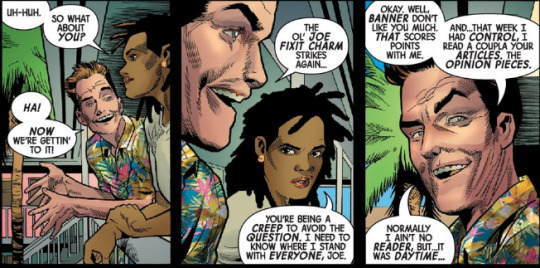
“okay well, banner don’t like you much. that scored points with me. and... that week, i had control.” - joe fixit, one of bruce’s alters.

“you’re right. i’ve rejected my diagnosis so many times. i’ve had this conversation so many times - with you, with other hulks. and i always slide back. i always... i let my depression take over. my self-loathing, the desire to...to have things end.”
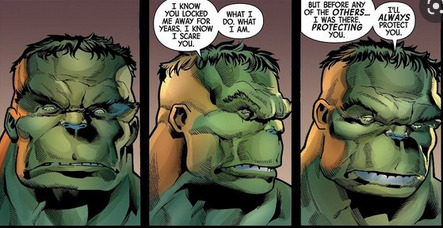
“i know you locked me away for years. i know i scare you. what ido. what i am. but before any of the others... i was there protecting you. i’ll always protect you.” - devil hulk, banner’s protector alter.
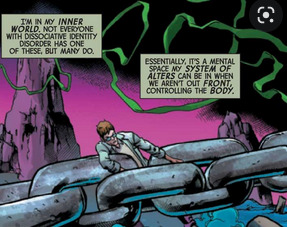
“i’m in my inner world. not everyone with dissociative identity disorder has one of these, but many do. essentially, it’s a mental space my system of alters can be in when we aren’t out front, controlling the body.”
the gamma radiation didn’t create the hulk. he has been one of banner’s alters since childhood. what the gamma radiation did was give the hulk and the other alters a physical form that was different from banner. that’s why jen remembers being she-hulk but banner doesn’t remember being hulk. the reason that hulk speaks in broken sentences and is prone to temper tantrums and breaking things? it’s because he’s a little.
2K notes
·
View notes
Note
Hi! First I want to say I love your Zutara dissertation. I was in a convo with a friend who said they don’t like Zutara because it hurts Zuko’s arc. I then linked them to part two of your dissertation where you explain how Zuko and Katara getting together would strengthen their arcs and the themes of the show. They then replied, “I see all these points. I just think this can be done via friendship. I think the idea that Zuko heals the world via friendships fits the show more since friendship played a bigger role then love stories.” Do you have any rebuttal argument for this that I can show them?
please give my commiserations to your friend for the frustration they must have felt when avatar: the last airbender ended with a grand romantic kiss because naturally, the all-important question of the finale was whether the hero finally got the girl after spending three seasons suffering in the friendzone. i'm sure your friend, being such a proponent of the importance of friendship over romance, must be just as critical of kat.aang in the finale as they are of a potential zutara relationship (and if they aren't, then you know where this argument is coming from and it's certainly not a place of legitimate media analysis.)
but on the off-chance that we're dealing with that rare breed of zutara anti that isn't a raging hypocrite: i fail to see why there's this weird dichotomy being made between platonic and romantic love at all. what exactly is wrong with zuko healing the world with both friendship AND romance? his platonic bonds with sokka, toph, aang and suki don't suddenly cease to exist just because he's dating katara, so why are we acting as if it's only one or the other?
atla is a story about the power of friendship, yes, but more than that it's a story about the the power of love. love for your family, blood and chosen. love for your friends. love for your countrymen. love for strangers, for enemies, for humanity. at its core, atla is centred around love in all of its varied forms - and yes, that includes romantic love.
or are we saying that sokka's love for yue, katara's romance with jet, sokka's relationship with suki, zuko's feelings for jin all had absolutely no bearing on their individual character arcs and the overall plot of the show? even kat.aang and mai.ko, badly written as they are, were important to aang and zuko's arcs in helping them realize the people they were truly meant to be (at least, before the finale fucked it up).
i, and many other zutara shippers, have always said that we'd have been fine with atla ending with no canonical romances, or with only a hint of zutara. i wouldn't replace the kat.aang kiss in the finale with a zutara one, even if it made more narrative sense, because i agree that romantic love was definitely not the point of atla - but that doesn't mean that it had no significant role to play at all.
given that your friend seems fine with zuko and katara's friendship, i'd love to hear why said friendship turning into a romance would suddenly be detrimental to zuko's arc. was sokka's arc about unlearning his misogyny ruined because he eventually entered a relationship with suki? was suki being inspired by sokka to take a more active role in the war undercut because she became his girlfriend? if not, then why would the zutara dynamic be the only one negatively affected just because they can kiss now?
zuko is a character who is fundamentally defined by love. his love for his people kickstarts his entire character arc. his love for his mother, and her love for him, is integral in reminding him to stay true to who he is. iroh's fatherly love guides him to the path of redemption. the gaang's platonic love, and the love he holds for them in return, gives him the confidence and support he needs to fulfill his destiny. so romantic love, the right kind of romantic love (and notably the only kind zuko never truly receives in the show) would only add to zuko's character - not take away from it.
200 notes
·
View notes
Text
Do you ever write some incredibly small throw away line that you think nothing of at the time but then it becomes an integral part of one of the characters for the rest of the story.
Anyway Fawn Spots Harry was definitely told by one (1) random person he had known for all of three minutes at the time not to give his name to anyone he didn’t trust because they could do bad things with it and he decided that that was going to be a core part of his personality for the rest of time tbh.
Which, to be fair, he doesn’t have anything other than his name after the Dursleys leave him. That last piece of his life that wasn’t torn away from him when they left him alone and scared halfway across the world. It was also the first thing of his that had ever been given value, with someone he hardly knew telling him that it was important enough to keep safe.
Is it any wonder that he guards it jealously? That he holds it close to his chest so it can’t be used to hurt him?
It’s why his adoptive family uses so many nicknames for him. Why Andy and Alex refer to him as “my child “ or “Bambi” or “the fawn” when speaking to others. It’s why Hydra hardly ever says it outside of Parsel and only around people he knows Harry trusts. It’s why May had to wipe away tears when Harry told her his name for the first time, open and trusting.
It’s why the wizarding world loses Harry’s faith almost immediately by plastering his old name (thankfully. he would have crawled out of his skin if he saw his new family’s name tossed around so carelessly) over children’s books and newspapers and gods knew what else like they had any right to it. It’s HIS name after all. His to keep or give away. Why should they get to take it without his permission?
It’s why even his closest friends don’t know his name is “Harry Cyprin” not “Harry Potter” until after they faced a troll and lived. And it a secret Ron and Hermione guard just as carefully as Harry does.
Ry is going to find out later and be so unbearably smug about it.
#the elf talks#harry potter#astoria fates kiss#fawn spots au#this was completely unintentional but it’s now part of him forever#Draco years later: what’s your name#harry: wouldn’t you like to know weather boy#do most of the agents know his name anyway? yes.#does that make it any less meaningful when he tells them proving he trusts them? nope they cry every time#of their two kids Harry is the one Andy and Alex don’t have to have the ‘lie on the internet’ talk to
29 notes
·
View notes
Text
Aisha smiled, shrugged, and hopped up so she was sitting on the end of the kitchen counter. “What? There’s a movie I want to see this afternoon with my friends.”
“Not your call, bro, I’m not living with you yet,” she raised a double-set of middle fingers his way.
okay to set brian aside for a moment. because i have nothing to say about him presently except loud continuous wheezing that transforms into piteous sniffling as i think about how tragic his circumstances actually are and then back into wheezing as i think about how fucking funny he's being about them. and also because aisha is the most special girl.
i actually wonder about the line where she references seeing a movie with her friends a lot. i don't know how much thought was put into it from the authorial end, but two other details we know about her are:
when we next see her after leviathan, she never mentions these friends again
her entire character is defined by the trauma of craving connection and validation while being deeply lonely and misperceived, and alec Understanding Her, Liking Her, and Being On The Same Wavelength As Her is why their friendship is life-altering amounts of meaningful for her
like, you kind of have to wonder about what her social life was like before leviathan & her trigger event dragged her away from normal life and into the caping world. shit sucked for her--she had abusive, neglectful parents and an older brother who was running himself into the ground & intermittently turning into his father in an attempt to take care of her--but it was at least normal enough that she could go watch a movie with friends. but the fact that she so easily, and without indication of feeling like she's leaving anything of value behind, absconds from that normal life + into the caping world, and the fact that loneliness and being misperceived is integral to her trauma and character arc, sort of makes me wonder if her friendships Weren't All That. if she did technically have friends, but was still the odd girl who gets tolerated in large part because she's funny. if sometimes she was in detention for "acting out" (having symptoms of adhd) in class while everyone else was going to the mall. i dunno. did she ever feel out of place and invisible at a sleepover even though no one was being explicitly mean to her. just, like, because she wasn't Clicking in the same way as other people. i don't think she had a Best Friend, but i think maybe sometimes she wished she did. i wonder abt her. i think she was quietly lonely.
the other thing is that we know that if she Really did not want to live with brian she would have already fucked off into the sunset or made the process far more difficult for him. that "not living with you Yet" means she Does anticipate living with him Eventually and doesn't actually have to be dragged kicking and screaming into it. she texted brian for help on the day he triggered...despite all her grievances he is her big brother & she loves and trusts him and is going to stick with him. and also justifiably and correctly give him double middle fingers when he tries to control whether or not she goes to see a movie
51 notes
·
View notes
Text
One thing that is so precious and important to me about Hob's character, is his utter regard for Dream's boundaries.
You may call him an idiot for not seeking any more intel on the entity that has apparently made him immortal without his express consent, and that is fair, but to me that is a deliberate choice on Hob's part.
At first, Hob's not even aware he's been made immortal and may have a price to pay for it, and once he does, he expects to be told of his debt when he meets the stranger in the tavern of the White Horse, one hundred years from 1389. Yet on their first agreed-on meeting, Dream does not corroborate Hob's dread for his integrity — of soul and of freedom. He remains entirely cryptic, but encourages Hob to take full advantage of his prolonged life, if only he'll report on it to Dream once a century.
From there, Hob doesn't feel the need for intel on his stranger so as to devise safeguards against him leveraging Hob's immortality against him. There's also in him immense recognition to the stranger for having turned him immortal, and demanded so little a price in return. Whatever his reasons might be, his own anonymity flagrantly matters to Hob's stranger, and it wouldn't be fair to his benefactor to dismantle it behind his back.
Obviously that does not deter Hob's natural curiosity for all things — as well as his desire to get closer to the stranger — from enquiring, but that only shows his contentement with what Dream is willing to give away about himself throughout the centuries.
Now you're going to tell me that running after Dream claiming that they are friends disregarding that Dream's just denied it in 1889 isn't very boundary-regarding of Hob, but I think he has a very different perspective on the event than Dream, and us readers/viewers following Dream's POV, do.
The problem is that Dream knows himself to be (and I quote) "one such as I", and yet how much he has in common with Hob. Hob doesn't.
What Hob means when he calls Dream his friend, is that Dream has given him exactly what he was willing to give him, and shown himself exactly how he wanted to be perceived by Hob, and that Hob's fallen in platonic love with that, with what he assumes is Dream's most authentic self, rid of what taints him in the eyes of the people who know "more" about him. He means "you might have done terrible things that have irremediably skewed your relationship with people that used to love you, but I love the person you've shown yourself to be with a blank slate. I've shown you all my own flaws throughout our acquaintance, you've helped me grow and become better and I don't believe you to be flawless, but in whichever way you may be flawed that you hide from me, it cannot eclipse how much I love you. And I want you to be aware of this. "
Obviously, Dream and us are well aware that "one such as I" refers to him being an Endless, but to Hob it can mean a number of things, and namely, I believe, "I who have done something so unspeakable it cannot be repaired nor forgiven by anything or anyone."
That is why he allows himself to run after Dream and assure Dream that he'll be here in a 100 years' time and if Dream's here then too it'll be because they're friends. He thinks Dream is so lonely because he was deprived of love, and doesn't allow himself to accept now love because something he has hidden from Hob makes him unworthy of it in his own eyes, and Hob is claiming that no, his stranger deserves Hob's friendship and that Hob will patiently wait for him to come to term with it, even if it takes him a century.
Hob just does not and cannot guess that what weights so heavily on his stranger's shoulders and consciousness is his mantle of Dream of the Endless.
In conclusion, Hob Gadling king of respecting boundaries 2K23
#the sandman#netflix the sandman#dreamling#the sandman meta#hobmurphy#hob x dream#hob gadling#meta#this takes a bit of a tangent but is rather coherent I think ?#or am I seeing too much into their 1889 argument ?#Nah I don't think so <3#Tashina if you see this : yes this was prompted by chapter 8 of the Storms of Life~#I've had this meta in mind for so long but never took the time to write it down thank you for inadvertently prompting me <3
104 notes
·
View notes
Text
A RANT
THE NEON LEON
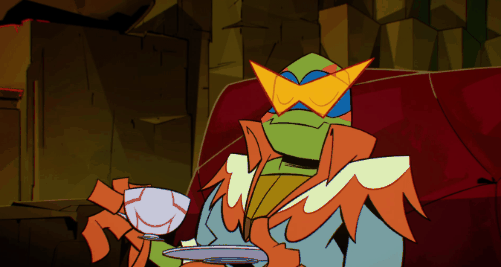
(II) Why he needs to fail at being a leader
Inspired by Skulltrot's Leo analysis on Youtube (WATCH IT, IT'S SO GOOD, I LOVE IT)
What? Crystal! You're contradicting yourself-
Shhhh! This is poetry, listen to me
One of the reasons i've seen people complain about rise leo, is his overall "confidence".
They find him annoying or reduce him to "the funny guy", the one that messes everything up in the movie and deus ex machina's his way to the power of friendship.
But honestly, i think this is so far from the truth; Leo is integral to the concept and culmination of the rise turtles, he cements the message this version of the turtles has been trying to explain from the beginning.
You can't do everything alone; trust those who love you, and love those who you trust.
But honestly, i think a lot of people forget that we've all probably felt like him before.
Leo is quite a complicated character to understand easily (mostly bc the rise series got horribly cut down and omg i'm still hurting), because an important part of his character is he will literally never be honest about what he's feeling. The only thing he talks about? How he knows (bc he doesn't just think it, he's so sure about it) nobody trusts him or thinks he's capable of holding his own weight.
He comes off as uninterested and goofy because he so desesperately clings to that portrayal of himself because he needs to trick both others and his own mind that he's fine.
He doesn't think he's enough, he believes the team would be perfectly fine without him. He thinks he needs to prove he can do something so he can be valuable to the team.
And i think it's amazing
"Rise of the TMNT", the title already gives away the purpose of their different personalities and coping mechanisms on this version of the story. We're not meant to see an structured team of properly trained ninjas, we're here for the ride, we are walking alongside them as the team gets in line and learn how to be heroes.
Sure the other versions of the turtles had their own character arcs, you don't need to see something from the instant beginning to know the characters are growing, but rise has always felt more of a love letter to the turtle family itself. A complete exploration of an alternate universe where the mad dogz got to somewhat live as teenagers before earning the mantle as protectors of the world (and new york lol).
We're familiar with Leonardo's story in evey tmnt version, he's the leader. He's in charge of protecting the city and his family.
But the problem is always there, he fears he won't be enough, that he will fail to be the leader the world asks him to be. This is also something we see in rise leo but it's more...fresh? It feels naturally younger.
Were you never nagged about not taking things seriously when you were younger? Were you never yelled at for messing things up? Didn't you ever feel as if you had to prove to others that you were more they perceived you to be?
As someone that battles their own inferiority complex, leo feels...so easy to relate to.
He didn't ask for the responsability, and he kind of doesn't want it, but he learns to bear it properly.
He fails to be the good leader they expect him to be (i also have the theory he self-sabotages himself a lot?) but he learns to be more than what they expect.
To quote myself from my last post (yes i loved typing that) "a leader is not the one that orders, but the one that motivates and supports you". He learns how being a leader is not imposing or bearing every problem and responsability alone, but to motivate your team and guide them to never loose hope.
He uses everything he already knows about himself and his team to be better and guide them to a new version of the ninja turtle gang, one where family and trust is far more important than anything else (and it feels good to know we won't have the typical raph vs leo fight for leadership in the future- i mean there was a fight BUT IT WASN'T ABOUT THAT)
Someone stop me i might just start a tmnt rant loop of my own making and i'm enjoying it😭
#tmnt 2018#tmnt rant#rise of the tmnt#rottmnt#rotmnt#rise leo#rise of the teenage mutant ninja turtles#thanks for coming to my ted talk
30 notes
·
View notes
Text
time for EVEN MORE CHARACTER ANALYSIS 🎉
(this time, with enneagrams!)
So, I love a good personality test, as I know many Tumblr users do. I’m particularly fond of Enneagram, because I feel like it gives a lot more insight into someone compared to, say, MBTI.
So, of course, I sat down and took the test twice: Once for canon Sun, once for canon Moon. A lot (and I do mean a lot) of this is based on speculation, so if you disagree, please let me know why!
I mostly did this because, y’know, there isn’t a lot of characterization for these two, and I wanted to see if I could gain any new knowledge from this. (Which, yep, it absolutely worked.) Hopefully this can be useful for anyone who wants more perspective on writing these two in a more day-to-day sort of setting. It’s almost all speculation, but I found it really interesting.
So, drumroll please… 🥁🥁🥁
Sun is a 2w1, and Moon is a 8w7!
Pretty different from what I found for them online (Sun as a 7w6, Moon as a 1w2). Thoughts on what these mean under the cut.
Most of my information comes from here! Some paraphrasing, some direct quotes. I won’t be directly citing everything because this isn’t an essay.
Sunny
The biggest and most interesting takeaway from Enneagram, to me, is the core hopes and fears.
Sun’s primary hope is to feel loved, and his secondary hope is to be good, have integrity, and be balanced.
Sun’s primary fear is of being unwanted and unworthy of being loved. His secondary fear of being corrupt, evil, or defective.
This is really interesting to think about in the context of the virus. He’s scared of being left behind, maybe doesn’t even understand why Moon is acting the way that he is and is terrified something’s just wrong with them. This could even apply in regards to being moved from the stage to the daycare, in a way.
His main motivations are to express his feelings for others and be needed and appreciated. His secondary motivations are to improve everything and be beyond criticism so nobody can say anything bad about him.
When going through a period of stress, Sun would become more like Moon’s worst traits. He’d be more proud, egocentric, confrontational, aggressive, dominating, vengeful, and demanding of obedience. If he were in danger during this period of time, he’d likely become destructive in his attempts to get out of it, even if that’s not the best way to handle it. He’d also likely become depressed, moody, irrational, hopeless, and ashamed of himself, more prone to self-destruction. He’d probably chase away people who try to help him and self-isolate.
I think that can definitely be seen in the ruin part of HW2 with Sun’s voice lines to the player, as well as how harsh he is on the player during arts & crafts.
When going through a period of growth, Sun would be creative, self-aware, introspective, gentle, compassionate, excitable, spontaneous, cheerful, and productive. He’d be able to be vulnerable yet emotionally strong, grateful for what he has, and excited about just existing. Very much like fanon Sun, honestly.
An unhealthy Sun would likely be manipulative, inflexible, self-serving, and domineering, able to excuse and rationalize his behavior because he sees himself as a victim. He’d likely be obsessive about others’ imperfections and wrongdoings, perhaps to the point of cruelty. He’d be prone to nervous breakdowns.
An average Sun (closest to what we’ve seen so far) would be people-pleasing, orderly, abrasive, overbearing, impatient, self-sacrificial, and codependent. Full of approval and flattery for others. He’d likely hover and mettle in others’ business and scold others for anything done not to his exact specifications.
A healthy Sun (unheard of so far in the games lmao) would be unselfish, compassionate, caring, hopeful, warm-hearted, forgiving, encouraging, and appreciative. He’d actually take care of himself, too.
To help Sun grow into that healthy category, here’s some stuff that would help…
Addressing his own needs before others’.
Not expecting appreciation for the good things he does.
Asking people what they need from him instead of just assuming and trying to help, and accepting that sometimes people don’t want his help without assuming that they dislike him or are rejecting him.
Not trying to call attention to his own hard work.
Learning to recognize the affection and good wishes of others, even if those things take a different shape than he’s familiar with.
Learning to relax and take time for himself, without feeling like this will lead to chaos and disaster.
Not expecting others to change immediately when he explains something, because what’s obvious to him isn’t always obvious to others and people just don’t typically change right away.
Not getting worked up about others’ (or his own) shortcomings, because frustrated with others gets him nowhere and harsh self-criticism just makes him feel worse.
Getting in touch with his own feelings and needs.
Moon
Now, this one was definitely harder. We get so little characterization for him. And yet…
Moon’s primary hope is to protect himself and be in control of his own life and destiny. His secondary hope is to be satisfied and content, and have his needs fulfilled.
Moon’s primary fear is of being harmed or controlled by others, and his secondary fear is of being deprived and in pain.
This is really telling compared to Sun’s. Moon isn’t scared of some sort of fundamental flaw within himself. He also cares much less about what others think of him, and just wants to be happy and safe.
His main motivations are self-reliance, to prove his strength, and to be important and in control of his environment and situation. His secondary motivations are to maintain his freedom and happiness, to avoid missing out, to keep himself excited and occupied, and to avoid pain.
I feel like this definitely tracks. He’s a gremlin that makes a hobby out of bothering the staff by pretending to be a boogeyman. That’s not “security” work (sorry, Moon).
When going through a period of stress, Moon becomes secretive, fearful, perfectionistic, and critical. He’d be reclusive and out of touch with reality, obsessed with yet frightened by his violent thoughts, and incredibly self-destructive. He’d judge others harshly while rationalizing his own actions and wouldn’t hesitate to punish others to get rid of perceived ‘wrongdoers’.
This aligns pretty well with what we’ve seen of Moon with the virus.
When going through a period of growth, Moon picks up some of Sun’s best traits. He becomes open-hearted, caring, focused, compassionate, encouraging, nurturing, loving, perceptive, curious, independent, innovative, and whimsical.
We haven’t really had a chance to see anything like this with Moon, but it feels closer to popular fanon perceptions as well.
An unhealthy Moon would be ruthless and violent. He’d be reckless about his own safety and straight-up murderous. He’d be impulsive and never know when to stop or when he’s taking things too far, and eventually run out of energy or get too broken-down and just give up on himself.
An average Moon would be self-sufficient, hardworking, hyperactive, self-centered, and proud. He wouldn’t pay much attention to his own emotional needs. He’d be combative and intimidating to get his way, and not shy away from threats to get obedience. He’d always be doing things to avoid boredom and have a larger-than-life persona just for the fun of it.
A healthy Moon (at long last…) would be brave, confident, resourceful, decisive, cheerful, passionate, and assertive. He’d actually be very extroverted and easily excited, which goes against a lot of popular headcanons for him, but then again this is the guy whose entire characterization is one long performance of hide-and-seek/tag with the monster under your bed. I feel like it makes sense that he’d be more social when the threat of his worst fears coming true isn’t looming over his head.
How would Moon reach that healthy category?
Recognizing that he’s at his best when he does things like take charge or help people through a crisis. He needs to use some self-restraint and try to inspire others to do what he wants instead of just forcing them.
Learning to let others have their way sometimes, and recognizing that doing this usually won’t mean sacrificing his power or his real needs.
Recognizing that the world is not against him and letting in the affection that’s available.
Accepting that he depends on others and not alienating them.
Not overvaluing being feared/obeyed, and recognizing that those things are not a stand-in for love.
Learning to be less impulsive.
Learning to listen to others, as well as learning to be comfortable without constant stimulation.
Accepting that he doesn’t have to have everything immediately.
Choosing quality over quantity in experiences.
Making sure that what he wants will really be good for him in the long run.
What do these types mean for their relationship and how they’d interact with each other?
They’re more alike than they initially appear!
Both are action-oriented and want to have a personal impact on their environment.
Both can be sentimental and deeply feeling, with a soft side that isn’t as apparent.
Both can play the roles of provider, protector, caretaker, and nurturer while avoiding or even denying their own needs.
Both tend to overwork themselves and be the ‘strong one’ in relationships, although Sun’s type is more likely to be the power behind the throne whereas Moon’s type is more likely to be the one on the throne, which I found really interesting.
Both are passionate, generous, and have good people skills.
Both are strong-willed and like taking on responsibility, as long as they choose it themselves.
Both easily play the roles that the other needs and wants. They see each other’s best qualities and can be the other’s strongest supporter and admirer. They also have clearly-defined roles, so they tend to not get in each other’s way. They make powerful allies who complement each other’s strengths, particularly the good effects they have on others.
However, they have very different values: Sun’s type is more person-oriented, and Moon’s type is more practical. Sun’s type also tends to be more indirect, whereas Moon’s type tends to be more direct. Sun’s type is much more likely to get attached to people and see things from their point of view, whereas Moon’s type does not.
When they’re not doing so good, they may be prone to arguments over whose views are correct: Moon’s confrontational attitude and tendency to shut others out, or Sun’s possessive and self-sacrificial behaviors. Sun’s type is more likely to get caught in a codependent relationship with Moon’s, becoming an apologist and enabler for his bad behavior.
The breakdown in mutual communication/respect/trust would involve Moon seeing Sun as insincere and manipulative, and Sun seeing Moon as cruel and domineering. They’d both become more controlling and harsh with each other, both prone to paranoia and fear of betrayal.
I feel like that’s kind of where we’re at in the games. Sun chooses not to outright warn people about Moon a lot of the time, and they both try to gain total control of their shared body and shut the other out.
AAAAND… DONE!
I hope this was at least an interesting read for you guys, and offered a new perspective on these characters! I recommend checking out the link for further insights into the personality types, because I tried to just limit it to character motivations and interactions and that alone has been ridiculously long.
hey, sunnie, why’d you do this?
neurodivergency. next question.
#fnaf sun#sun fnaf#fnaf moon#moon fnaf#daycare attendant sun#daycare attendant#daycare attendant moon#fnaf dca#dca moon#dca sun#dca fandom#fnaf sb#fnaf security breach#fnaf#fnaf daycare attendant#fnaf hw2#fnaf help wanted 2#fnaf headcanons#fnaf hcs
33 notes
·
View notes
Text
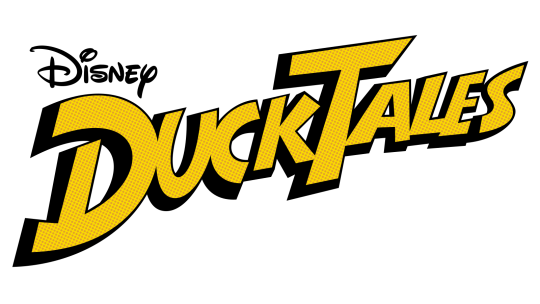
DT17 Anniversary Posting
So I've heard around the cafeteria that there's a theme for today centered around people's favorite episodes. Well, I don't have [a] favorite episode. But I can narrow it down to 1 per season, so let's go with that.
(P.S. if you were tagged in this post it's because I gave you cool people a shoutout at the end.)
S1: The Last Crash of the Sunchaser!

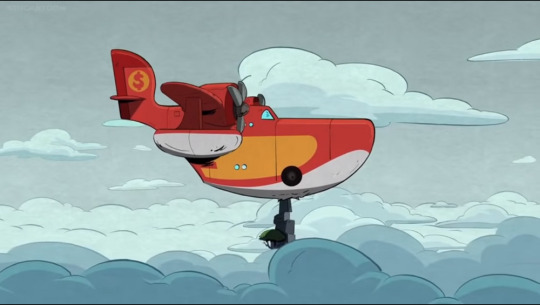

When I first watched this show, this episode was the one where I realized things were serious. This wasn't just a funny duck show. It's definitely still funny and a duck show, but it's so much more than that.
On Disney+, this episode comes right after Lena is possessed by Magica, so my mind was 100% on that heading in. Instead, we got the resolution to Dewey's arc and the mystery of Della Duck... or so we thought!
Sure, we found out Della's fate, but that was almost secondary to the family drama, especially between Dewey and Scrooge. It's very intense, and even when we get the answers we're looking for, the questions all change.
I don't need to explain why this episode is good. It just is. The fact that I picked this episode, and not a Lena-centric one, shows how good it is.
S2: A Nightmare on Killmotor Hill!
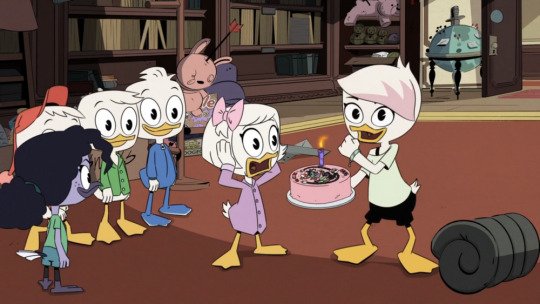
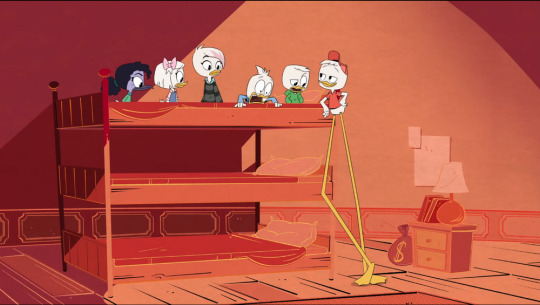
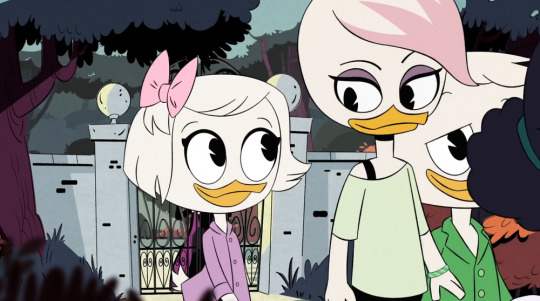
Alright fine. One Lena episode.
After Lena was brought back in "Friendship Hates Magic!", the question was, where do we go from here? I think they handled it very well, integrating her back into the kids' friend group while still letting the effects of Magica's abuse linger on.
I really enjoy the idea of characters' dreams showing their deepest fears and desires. The kind of stuff they would otherwise stash away when they're awake. This episode took that concept and sprinted with it.
I still think we ought to have had more sleepover episodes with all of the kiddos. When everybody is fighting for screen time in Season 3, this episode shows how you can balance several characters at once, even if Lena was the one getting the majority of the attention. The "Swanstantine" episode is another good example of this.
I mean, come on. We got Webby dressing herself up as Scrooge McDuck as soon as she realized she could do whatever she wanted. It was foreshadowed from the beginning!
S3: Astro B.O.Y.D.!
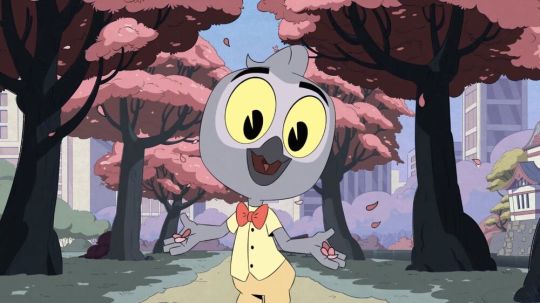

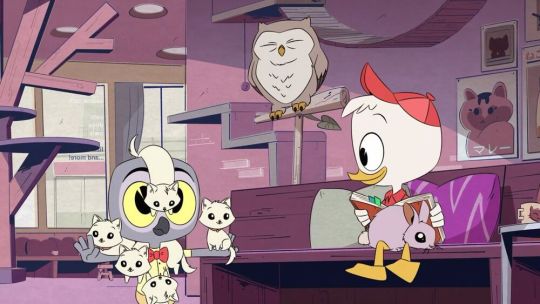
I've talked about this one before. It's one of my favorite pieces of autism rep. Boyd's journey in this episode really resonated, as well as his relationship with Huey.
In my opinion, the best part about it is how Huey relates to Boyd. Specifically not because he's a robot, but how Huey sees him as just a kid, just like him. The robot part is more of a neat quirk than anything. He's wired differently, literally, but they deserve a chance to be themselves.
And I appreciate how "Astro-B.O.Y.D!" gives Boyd a purpose as a character. I thought the bit in the Doofus episode where the villains try to pull the same con as Louie was fun, but Boyd didn't feel like much of a character, or at least no more of one than Sharkbomb was.
So "Astro-B.O.Y.D!" takes a character that very well could have had a one-off bit role, and made him something special. Made him somebody that a viewer can relate to, just as Huey did in the episode. Even just for 22 minutes, Boyd felt special. I felt special. I felt seen.
So yeah, that's my three. The fact that I can sit here and ramble about a half-decade old show that ended before I found it, is really cool. I'm so glad to have the chance to hang out with everybody here, whether we're discussing the best show in the history of time or doing literally anything else.
Shoutout to the people rallying the troops for today's anniversary... @secret-tester @justaboot @alexcanine @boingodigitalart @yeyeducks @cookieruby @the-richest-duck ... and to everyone else who's participated not just today but any day. We wouldn't be a community without the fine folks in it.
#ducktales#ducktales 2017#ducktalesanniversary2023#the last crash of the sunchaser!#a nightmare on killmotor hill!#astro b.o.y.d.!#dewey duck#lena sabrewing#boyd gearloose#dt cafeteria table posting
60 notes
·
View notes
Text
Okay can we talk about Simon from Wish real quick? Can we talk about the wish lore of Wish? Because I love that we got more on this magic than I thought we would, but there is something here that is really making my brain itchy. So Simon is one of the Seven Dwarf parallel characters, and he's sleepy and out of it all the time. The movie seems to indicate this is because he gave the king his wish, since he's the only character in this group that's 18. And like, what a horrifying implication! His wish is such an integral part of him that its absence has left him struggling to function in everyday life, and the king does not care about this whatsoever. But when he betrays his friends and rats them out, Magnifico grants his wish and tells the crowd he wished to be an amazing knight that served the king. And it hurts him to have that wish granted.
Why does it hurt him? Is it the corrupted state of the King's magic? Is it the guilt of betraying his friends? Or, is it because that wasn't really his wish? Like I dunno your majesty, it seems a little too convenient that his wish would be to serve you. Like earlier in the film, we have him trying to con Asha into wishing to be the best apprentice for him. Like, I firmly believe this man only saw potential in her because she wasn't 18 yet, and sir you are rancid for it. So if that's the case, what was Simon's real wish? What did his heart want more than anything? I wish we got to see that. The same goes for Asha's mom. Like it's a BIG deal that her wish is SHATTERED right in front of her, we get to see in real time just how powerful wishes are, and how much damage the king can do when left unchecked. I feel like it didn't have to be much, but I would like an answer given how important they are to Asha.
My guess is that Simon's wish was something very small all things considered. Maybe he didn't want to fly or change the world, but perhaps he wanted to live a happy, comfortable life. Have a little home where he and his friends are safe and secure. It feels like Simon is a very humble character, so he'd have a humble wish. And taking away something like that, making them feel like they can't have something as basic and integral to being human as happiness, would be a really good reason for him to feel so incomplete and broken. I wish this story had focused on it a little more, the danger of putting your dreams in someone else's hands. The danger of hopelessness. I really like the messaging that you can make your own dreams come true, and towards the end we get a brief glance at what it means to have good friends to help you along the way. I wish we had just a smidge more time to see Simon and his friends make that a reality. Maybe if I do any AU stuff, I'll take a sec to give that some love.
14 notes
·
View notes
Note
Hello big brain, I wonder if you can help me figure something out about RWBY. I am trying to see more in Oscar, but the parts of his character that interest me the most are his background art and hints at the future, rather than any actions or dialogue he's had so far. The one exception is his conversation with Ruby about fear. I am down to clown with this show, I know and love the story of Tip and Ozma, but Oscar feels to me like sneak preview of something that hasn't aired yet. Who is this kid? What did I miss? How do I love the green boy?
Hi anon!
I am so sorry for this super late reply! I wanted to finish some longer meta first :)
Anyway, here are some of my metas on Oscar:
An overview on Oscar
Some thoughts on Oscar and Ruby
Some thoughts on the Wizard of Oz allusion
In general, I think that if you are not particularly interested in Oscar... there is really nothing to do :''')
In my opinion, Oscar is one of the best written characters in how his story is well integrated in the main plot and rather thightly written. His development is perfectly interwoven with the events and it does not feel that the narrative has to take away time to focus on him. On the other hand this might be why you feel you can't pintpoint him so well. He grows a lot, but his development happens so naturally you might arrive at the end of it and ask: "Wait, what happened?"
Anyway, about the things you say interest you the most:
I am confused about what you mean by background art. Do you mean Oscar's room art? In any case, I don't think Oscar's background is so important tbh. His story really starts when Oz appears and its focus is his relationship with the Wizard and how it influences his sense of self - identity :)
You are right about a climax still needing to happen for Oscar's arc. I think he and Ruby are among the characters who will take a rather large portion of the final section of the story
In general, Oscar's foiling with Ruby is a good way to look at his character. I am gonna give you a rather schematic and synthetic overview.
Parents and Children
The crux of Ruby and Oscar's arcs is the relationship with a parental figure, that they decline in opposite ways:
Ruby's story starts with Summer's sudden disappearence
Oscar's story starts with Ozpin's sudden appearence
This is why Ruby sets off on a journey to follow into Summer's footsteps, while Oscar sets off on a journey to find out who he really is. They both meet Oz and go to a Huntsman Academy (Beacon-Choice for Ruby and Haven-Knowledge for Oscar). Still, they do so driven by different motivations.
Ruby wants to save the world (the macrochosm), while Oscar wants to become his own person (the microchosm). This difference is well conveyed through Ruby and Oscar's major ongoing motif: outside/inside.
Ruby is focused on the outside, so that she can avoid looking inside.
Oscar is focused on the inside, so that he has trouble dealing with the outside.
Leader and Teammate
Mistral is the arc where Ruby fully becomes the leader, while Oscar fully integrates with the main group. This happens especially after Oz's disappearence in volume 6. Then is when Ruby and Oscar have to step up in different ways:
Ruby has to shoulder the group (team-leader)
Oscar has to shoulder who he is (team-member)
Once again Ruby has to take care of the macrochosm. She needs to make sure others are okay and to bear everyone's fears and doubts. Oscar instead has to deal with the microchosm. He needs to face crippling self-doubt and to decide who he wants to be on his own.
This struggle is solved in the fight against Cordovin. There:
Oscar comes up with the idea to destroy Cordovin's missile launcher by observing from outside:
Oscar: Right, but her missile launcher doesn’t lock in, it pops out! Without her shields, one well-placed shot could detonate the missiles while they’re still in the launcher!
Ruby executes the plan and defeats Cordovin by acting from inside:
Jaune: The missile launcher springs out… but the raw dust gets locked in!
Ruby still gets an active role and Oscar is still passive, but they are still progressing. Finally, they succeed at becoming a leader and a member of the group, respectively:
Ren: You (Ruby) petrified a Leviathan... after diving down the barrel of a cannon!
Ruby: I mean, Oscar made a successful crash landing! He's a fourteen-year-old farm hand!
This new-found identities are tested in Atlas, where Ruby and Oscar meet a strong foil: Ironwood.
A New Approach
Ruby and Oscar both foil Ironwood, in opposite ways:
Ruby foils Ironwood when it comes to leadership
Oscar foils Ironwood when it comes to self-identity
As a matter of fact Ironwood is struggling to cope with Ozpin's disappearence, just like the 2 kids are doing. Ruby and Oscar just happen to comment different parts of his arc:
Ruby like Ironwood has to step into a role of leadership and wants to find a new approach. This is why she is intrigued by the Amity project. She also has to struggle with trusting others.
Oscar like Ironwood has to grow into his own person without Ozpin's guidance. This is why they are shown training together and growing closer. The way Ironwood treats Oscar is symbolic of the progress of his personal journey. It is not by chance Ironwood grows when he listens to Oscar (not Oz). They are both trying to become the best versions of themselves.
And yet, Ironwood falls and symbolically he does so by giving up on the Amity Project and by shooting Oscar. Still, Ruby and Oscar push forward.
Ruby is the one who ends up using Amity to tell the world the truth. Oscar instead doesn't give up on trust or who he is because of a failure. He keeps on trusting himself and others, even enemies. In this way, he succeeds at guiding Ozpin, whereas Ironwood never could.
Once again, you see Ruby taking care of the macrochosm, while Oscar takes care of the microchosm. Ruby warns the world, while Oscar warns Salem's inner circle.
At the same time, Ruby and Oscar also make progress with the crux of their arcs:
What are you?
The Girl Who Fell Through The World
Oscar: I thought the idea of falling through Remnant into a new world was exciting. I never understood why she was so sad when she finally made it back home. But now it makes more sense.
Ozpin: She wasn’t the same girl anymore.
Oscar is the one who introduces Alyx's story to the audience and he is the first character to relate to her. Oscar himself is like Alyx, after all. He left home and is changed by his journey. This makes so he is now not the same person as to when he left home.
Ruby goes through the same realization in volume 9, when she ends up specifically in the Ever After, the set of Alyx's story. She too is not the same happy child who left home to save Remnant. And she has to face this truth.
Once again, Ruby and Oscar are opposite and yet the same. They have similar fears and doubts, but face it differently:
Ruby is focused on the world and refuses to look inside, so she is forced by the narrative to make a deep dive into her own self. She falls in a world designed to challenge and eventually heal her.
Oscar is focused on the self and is definately one of the most introspective characters. I mean, he is literally the only one we hear the thoughts of thanks to his conversations with Ozpin. So, he doesn't need more introspection, but rather to act and to face challenges outside himself. This si why he doesn't fall, but is asked by the narrative to keep going even without Ruby to guide him.
In short, Ruby and Oscar have parallel arcs, but our Little Red is forced to go inside, while our Little Ozma has to wait outside.
Still, they are both asked to define who they are. This happens with some clear parallel scenes:
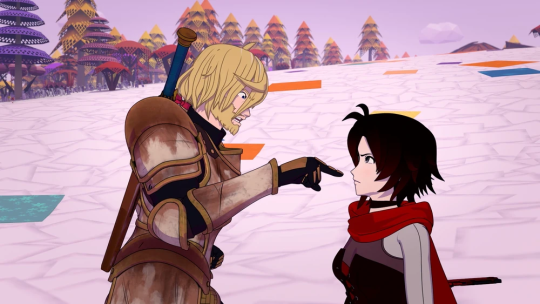

For example, Jaune lashes out on them, which sets them both off, but in the end their crisis has a positive resolution, since they both grow more into the people they need to be:

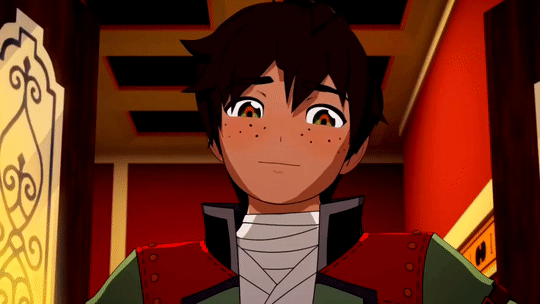
At the same time, they both fall:

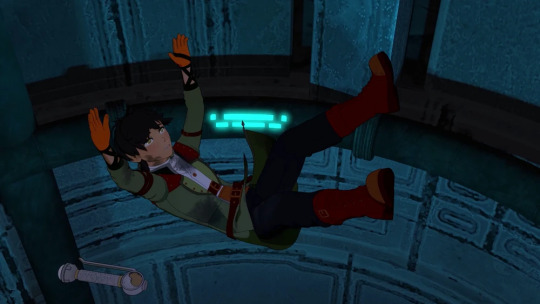
But this fall ends with them successfully grabbing their weapons.
Grab your weapon! Get a hold of yourself!


Both Ruby and Oscar reach out to their weapons in parallel scenes. This happens because they are both getting a hold of themselves. Sure, their growth and journey is still not complete, but they are not lost. They are still themselves, despite all the changes. They are not the same children they were in the beginning, but they are still Ruby and Oscar. They are still Someones.
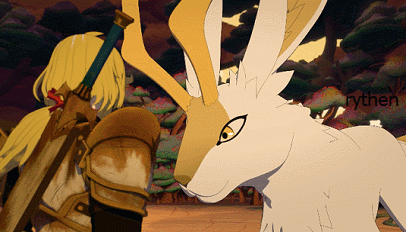
So, Ruby realizes she doesn't have to be Summer, but can be herself. Oscar instead realizes (well not really, but he is getting there) that he is still himself despite the merge with Ozpin.
About this it is interesting to notice how Ruby's wish is really Oscar's fear:
Ruby wants to become Summer
Oscar doesn't want to become Ozpin
The end result for both will be to realize they are their own people. Sure, they may grow similar to Summer and Ozpin and be influenced by them. Still, they are different people with ultimately different stories and destinies.
This is more or less where we are with Ruby and Oscar's story :)
Thank you for the wait and have a nice day!
84 notes
·
View notes
Text
ALRIGHT SO !!
Shiryu as Hadès and How His Character Could Have Had More Screentime (this is going to be long and like...not even half of what I have to say sorry)
First of all : Shun is actually a good character for Hades, the whole kind guy turning into World's End Maker was a good plot twist BUT character wise he was already pretty central and full fleshed, Shiryu otherwise....erm (I rlly love Shiryu but he gets so bad/forgattable after Sanctuary...sick) + don't forget those are the main plotlines !!! I have a whole developpement in my head but you don't want to read a whole novel so please bear with me
I feel like he was tossed a bit of the side after the first arcs and it genuinely makes me sad, his character is a bit alike to Shun's on some points but except losing his sight every five episode well...he's not as well developped as Shun lmaoo 😭 that's why I believe it could have been interesting, even without the whole developpement points who are hard to add in a show like this, his character could have been a little more than what he is...Shun has a pretty shiny role, Seiya is the mc, Hyoga has a familial story or something like this every arc, and Ikki also has meaningful parts in fights/story, while I feel like Shiryu was often here because well he had to, but doesn't have a role that big (minus maybe in Asgard, but here he was a bit of an ass with fenrir for no reason so um 😭)
Anyway so ! First of all, Shiryu is the only one without a known family member (Seiya -> Seika, Shun -> Ikki, Hyoga -> his mom), no real backstory, nothing (thanks Ohko for trying at least, genuinely it made Shiryu's character rlly much cooler) so I decided to change it to give him at least something ! Also the necklace trope is also included but I won't extend myself on it, you guys know how it works
Changed his whole non existent backstory in the AU, basically, instead of being an orphan with the other kids, he would have been taken home by Dohko, who would have protected him from Pandora and Hades when his parents died from their attack (I always saw Shiryu as Chinese, I scrapped the whole brothers trope bc I don't like it + it's manga only) Dohko is a powerful Saint and could have done that.
I feel like he'd know Shiryu was like...different, his job is looking at the reincarnation of the Specters so yeah, he felt it. But killing a child, right after Athena was taken away and almost killed ? Yeah...no...he'd feel too bad, and would take Shiryu with him instead, keeping it to himself in hopes a good teaching and keeping an eye on him could prevent anything bad from happening (almost worked ig, oops)
It could make an interesting plot point with Shiryu and Dohko's dynamic, because as much as Shiryu likes him as a parental figure and master, he knows he's keeping secrets from him, and would feel some resent when learning about the truth y'know ??
After that it doesn't change much from the plot, except when it comes to dynamic within the Bronze group : Shiryu is sent to check what the hell is going on with the Galaxians Wars (a bit like Hyoga did in the manga), Ikki makes a whole ass mess, etc etc. Also it'd "explain" how Shiryu was so eager to end Ikki's life : he doesn't know him like the others do. For him he's just a threat to put an end to, which would be interesting dynamic wise too...Seiya would try to integrate him to the group, Shun, while understanding his view, would feel some kind of discomfort BEFORE trying to learn to know him better (I love their friendship srry), and I feel like he'd connect with Hyoga with the whole "My dad is a Gold Saint and while I love him well sometimes he tends to be a bit weird with me" and with Ikki I have a whole another plotline but I can't sum up that. This post is already long enough. Anyway the dynamics would have been changed and I think it's interesting to learn to know characters through someone who doesn't know them as much as they do know each other ?? Honestly most of the developpement is made in my head here are just the big lines
ANYWAY, back on track, nothing changes that much from the og anime before Hades (or it does change in my head because Shiryu was badly written in those ‼️or not written at all idk) and...yeah 😭 whole big mess...Dohko has to explain to Shiryu how and why he kept like...HUGE stuff from him all his life in order to protect him, also to Shion because "why the fuck didn't you say anything" (he cares for the kid and was afraid Sanctuary would take him from him), also I don't really remember how the whole Pandora plot point was made in the thread I made with the person on discord (sorry it was in march but I remember Pandora has a different plotline than in the og anime) but starting here it's just, yeah kinda the same I guess !! Except for the Ikki part/dynamic with Shiryu, but ONCE AGAIN it's a part of my Shiryu/Ikki plotpoint and it'd be too long (before some ask, YES, Ikki stops himself from killing him, because YES, Ikki cares about his friend group), also if it sounds silly sorry, but he sometimes (in the og anime) had a bit of extreme reactions, was willing to go pretty far to protect the people he cares about (Fenrir, Ikki...) and it could be a bit of a hint to his soul sometimes awakening to his Hadès self... He's not like, cruel or really mean, there's just sometimes something off about him, he sometimes "shifts" slightly and ppl can't really pinpoint what it is (not sure about this one does it make sense ???? Idk)
The most important parts of this AU are basically the developpement of his character through that "newcomer" lenses, learning to trust the others, and overall develop a more meaningful dynamic with them and giving him a bigger role !! I know it sounds a bit "Saint Seiya, everything is the same minus Shiryu is Hades" but there's more to that I swear, it's just hard to explain like this without making huge walls about dynamics
(Can you tell I'm shitting myself. Please don't be rude rlly, if you don't like the idea just ignore !!)
#this is way too much plot and developpement for sts i'm sorry LMAOOO i know all of this would never have fit inside the show#ALSO DON'T BE MEAN OR CRITICIZE THIS I'M NOT A BETTER WRITER THAN KURUMADA OK I JUST THINK SHIRYU DESERVES MORE SHINE#erm erm anyway this is a bit personal to share damn.... anyway 😁 hope it wasn't TOO bad i did this at midnight while playing flash games#sorry if it's disappointing !!!!! personally it makes me happy#kotz#knights of the zodiac#headcanons#cygnus hyoga#dragon shiryu#pegasus seiya#andromeda shun#phoenix ikki#hades saint seiya#saint seiya au
30 notes
·
View notes
Note
A movie question I wanted to throw your way: what do you think about the decision to use a decent amount of physical acting on Rickman’s part for comic effect? I’m thinking his snatch of thin air in Philosopher's Stone, his creeping along the table towards Ron and Harry in Chamber, his dramatic point in that same scene, his walk up to the stage for Dueling Club, his whacking students in Goblet and Order, etc.
On one hand, I feel like this does match the tone of the books; he canonically lurks and prowls and points and snatches at the air, and his menace is often undercut by a physical description that’s meant to be some level of comedic. On the other hand, we don't see Snape nearly as much in the movies as we do in the books, so this aspect of his character seems somewhat overinflated by the movies?
TLDR I don’t think these decisions in the movie were completely out of left field, but it also feels off for some reason. Idk I don’t know how exactly to verbalize my feelings on the matter and wanted to hear your thoughts!
It will probably come as no surprise that I feel like any answer to this question is inseparable from the absolute hatchet jobs that are Steve Kloves' screenplays for the HP franchise. This reply is going to end up inevitably long (you ask me about my favorite subject, you suffer the consequences), but all of it is ultimately framed by the problem of having to make the best of a badly written script. (**edit: This post is way too long. Run away. Don't look back.)
The writing doesn't support the story
The first thing that jumps out to me is that there's a separation between where and how these comedic moments are used, up until the end of GoF and after. They're more a part of the story only until Harry's story arc reaches the point of Cedric's death, when he first witnesses death in the way that allows him to see thestrals after. GoF is when the story takes its first dark turn, and up until then the tone and story is much more in line with children's literature, so it makes more sense that Snape is portrayed in a bit of a playful way. After GoF - even though the films reveal it as an aside and much later than the original story does - Snape resumes his role as spy and becomes more integral to the story as a key character and is thus no longer just a foil in a children's story. I think what doesn't work about it is the inconsistency. The books have comedic moments with Snape too, which are cartoonish, up until the end of DH - I feel those are also out of place, but at least their existence gives a basis to what's done in the films.
Nevertheless, one of the biggest problems with the films is that they're badly edited. I'll leave that analysis for another post (you're welcome), but essentially these comedic moments feel inconsistent in part because there's often a disconnect between the performance a director has asked of his actors and the tone that's established in the editing room once pacing and a soundtrack are added. Any vision a director had for these films was muddled by the involvement of big studio producers and limitations. This is made more jarring by the way that Kloves has interjected light, funny moments in awkward ways throughout the scripts. He struggles overall to convey the world that Rowling has created, and if it weren't for the brilliant production design of Stuart Craig, Kloves' failures would be much more obvious (again, worthy of its own roast post).
Take the scene where Snape whacks Harry and Ron on the head in Gof: why are the students all studying in the Great Hall? Why are various years sitting together? Why is Snape overseeing them? It's a scene almost verbatim out of the book (Fred asks Angelina to the ball casually, he and George tell Ron and Harry to get dates "before all the good ones are gone," we find out Hermione already has a date), but like pretty much every scene that originally takes place in the Gryffindor common room, this one is moved to another location for no discernible reason. The main difference in the change is how restrictive it is: in the common room the children are free to be themselves, but in the Great Hall, under a strict teacher's nose, they have to be quiet and restrained. Another subject that would need its own post is the myriad of ways Kloves goes out of his way to rewrite settings and characters to avoid allowing them to express themselves or grow as characters, and how hard he works to stifle and limit them in ways that are convoluted and work against the story, as if he himself couldn't deal with any kind of emotional vulnerability (in a way, his scripts are a desperate cry for help). This directly contributes to why so many of Snape's comedic moments feel off.
The changes in the scene in GoF don't even make sense from a production perspective, as they required more actors, more lighting, and more setups. Instead of using the cozy setting of the common room to establish camaraderie between the students, Kloves replaced that energy and lightheartedness with Snape in a way that's uncharacteristic. The scene, as he wrote it, is already light and has humor, but Kloves doesn't trust it - he feels the need to exaggerate it and the casualties, as always, are the characters and their portrayal. It's as though he's following a formula and saying, "this page number/scene number must provide relief from the tension of the story" and then doesn't consider how following that directive fits into the rhythm of the narrative. It's closer to being an isolated scene akin to a comedy sketch than to a scene that's part of an act that's part of a film. It's worth noting that, in GoF, Kloves interjects this scene as if he's forcing this moment of comic relief into a story that didn't require it and then relies on playing off of Snape's usual seriousness as its crux. In OOtP, when there's a callback to it as Snape smacks Ron with a book again, it's no longer the point of the scene, but an aside in a comical montage focused on Umbridge (OOtP was also the only film not written by Kloves, so this moment is more likely the result of Michael Goldenberg trying to maintain a consistency with Kloves' work). Overall, I think that feeling of something being off is, again, more rooted in the writing than the performance.
Rickman as an actor playing Snape
There's a lot of criticism in the Snapedom of how Alan Rickman portrays Snape, but not enough acknowledgment that none of the characters are portrayed well, and most of it comes down to Kloves' writing of them. Book!McGonagall insists that all students under 17 are evacuated before the Battle of Hogwarts, where Movie!McGonagall only cares that the Slytherin students are locked in the dungeon, everyone else can stay, what does she care if first years die? Book!Hermione is intelligent and empathetic while Movie!Hermione is a two dimensional maternalistic harpy whose main job is to be a mouthpiece for plot exposition. Book!Ron is funny and brave and fiercely loyal, while Movie!Ron throws Hermione under the bus, is cowardly, and is reduced to a flatly written sidekick. Book!Harry is complex and while I could list a million examples, I'll stick to this one: in PoA when he finds out Sirius betrayed his parents, he's enraged but has no reply when asked if he'd want to kill Sirius. Movie!Harry says with conviction, and without prompting, that he wants to find Sirius with the explicit purpose of killing him. Every single character takes a hit because of how Steve Kloves writes them, and Snape is, sadly, no exception.
While some film shoots allow for improvisation, a big budget production on a tight schedule with scenes that require a lot of prep work can't afford to make many changes. So, for example, while Ralph Fiennes was asked to improvise his scene as Voldemort at the end of DH2 when he re-enters Hogwarts victorious (and that's why the dialogue is redundant and that weird hug with Draco continues to plague us), it could be done because the wardrobe and set and cast were already in place and the time required had already been scheduled in. It wouldn't be possible, though, to add an additional scene - like Snape going feral in the hospital wing at the end of PoA - unless it was written into the script. Additional actors would be required, which would mean coordinating with their schedules and adding them to the budget, not to mention scheduling in additional days with the crew who may already have other work lined up. It would require either pushing every other shooting day back - which is near impossible - in order to use the hospital wing set while it's still up, or tacking on production days to the end of the shooting schedule and rebuilding the set on those days. This can be done for necessary pickups that round out existing scenes, but you can't really say, "hey I decided we need a scene here that didn't exist before" without causing huge problems. Because of how contracts work, any significant scene changes would have to be sent back to Kloves who would have to write alternate scenes and/or dialogue, and even then if you wanted to fix a specific character's arc - like Snape's - you would have to add in so much that it just wouldn't be feasible. Screenplay lengths have to fall within a certain number of pages, because each page is approximately a minute of screen time, so adding a few more to a finished script mid-production is very difficult. The actors have to make the best of what's on the page. Which brings us to Alan Rickman, his choices as an actor, and what informed both him and the character of Snape.
Alan Rickman was a RADA trained actor, so his approach to a character involved a lot of physical work as well as character analysis. As far as I know, he was the only actor to contact JK Rowling directly to ask about his character, because he wanted to make an informed decision about how to play him since Snape was so nuanced and gray. Unlike some of the other actors (like Michael "DIDYAPUTYANAMEINDAGOBLETOFFIYAH" Gambon) Rickman read the books - those that were available when he took on the role, and each as they came out afterwards - and used them to inform his understanding of his character beyond what Kloves wrote (presumably in crayon with all the e's backwards). In interviews and Q&A's it's clear Rickman was fond of the HP books and story, and had a thoughtful process taking on Snape's character. He did not see him as a villain, because, as he's said, he didn't approach characters with that kind of judgment. And while I'm sure the egregious amounts of cash Warner Brothers threw at the actors was inevitably a factor for all of them, several of the ones playing teachers or other adults have said that they took on their role because a child in their life insisted on it, despite them being unfamiliar with the books, whereas Rickman's process was to read Rowling's books in order to decide whether to take the role. Again, he was a RADA trained actor, and thus had a meticulous approach to his work that followed a thoughtful, considered process and a decision based on whether he felt he could embody a character in a way that did them justice/if they were interesting enough to him. By the time he started shooting PS, he also had experience directing a film and was working as a director in theatre as well as still acting, so he understood the process from the perspective of not just an actor, but also as someone behind the camera, someone working with actors both as a peer and director, and someone sitting in an editing room.
We know from his diaries that he became increasingly frustrated with how his own process and expectations clashed with that of the producers on Harry Potter. He wasn't interested in renewing his contract after the first few films (goodness knows how much money they offered him in the end - his wife has said that he never let anyone else pick up a tab in a restaurant and if they argued, he would just say "Harry Potter."). He writes about seeing the films at premieres and being frustrated with how little story and development there is (especially for Snape), which makes me think there are deleted scenes somewhere that haven't been released. At one point he writes about a premiere party where he had internally lost patience with the three Davids (Yates, Heyman, and Barron). It's obvious that there's a discord between the work he wanted to do with Snape's character and what choices the production made:
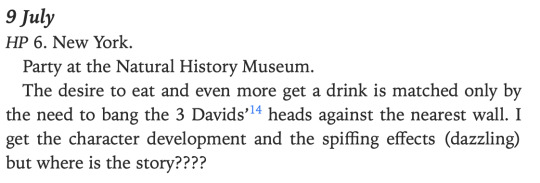
He describes how, during the filming of the Yule Ball scene in GoF, there was an attempt to get him to dance but he refused because he didn't think Snape would dance:

It was a rare moment of potential for improvisation because, again, the set and cast and timing were already accounted for, and in this case there wasn't even dialogue. The scene where he smacks the boys with the notebook - as far as I know - was scripted. So there's a difference there in how much freedom he had, as an actor, to say no to what he was asked to do. Even in the above diary entry it's clear that, given his way, he felt the character wouldn't even be present in that scene, but he had no choice. This tells me that when he had more freedom to make choices, he did so based on his understanding of Snape as a character and, given that he was an actor who was both very respected (and got away with more than most) and also someone who could get argumentative about his character choices, I think this is the most apt lens to examine his physical work with Snape through.
Knowing that he wasn't interested in continuing the role of Snape after the first couple of films and that he was often frustrated with the lack of characterization and story arc, his physicality in his first scene in CoS (when he reprimands Harry and Ron for flying the car) says a lot. (Caveat that one of the reasons he didn't want to renew his contract was that the shooting schedule restricted his schedule and he wanted work on other projects, but I can't help but wonder if that had been the case had HP provided a more satisfying process.) It's almost certain that he had read all the available books by the time the scene in CoS was filmed, including PoA where Snape becomes apoplectic with rage in a way that, to a child reader, is comical (and intended to be) and to someone analyzing Snape is clearly rooted in triggered trauma.
Alan Rickman knew from the outset that Snape's motivation was his love for Lily, so he would have understood the dynamic between his character and Sirius re: who Snape thought sold Lily out to Voldemort. He would also have understood that Snape's reaction in PoA was more about distress and anxiety, and that this was connected to the promise Snape had made to protect Harry for Lily's sake. This would have therefore informed his portrayal of Snape's anger at Harry in CoS, and it's reasonable to assume that Rickman was trying to walk the line between the way Rowling portrayed Snape in full unhinged rage in PoA, what this tells him about this character when angered, and the connection between the moments in PoA and CoS when it comes to Snape's anxiety over Harry's safety. Unlike the author of a book however, who has full control of how they tell a story, Rickman was an actor in a film - an inevitably collaborative medium which therefore made his portrayal reliant on the decisions of others as well.
Chris Columbus, the HP movies, and feral Snape
PS and CoS were directed by Chris Columbus, the guy who directed both Home Alone and Home Alone II and Mrs. Doubtfire. He was a successful director from the 90s tradition of children's movies whose sensibility was informed by the era's attitude towards children's media: kids wanting to see themselves in narratives, in ways that felt empowering and allowed them to process the confusion of a world run by adults in playful, quasi-cartoonish ways within a 3 act structure where the villains - mean adults - get their comeuppance because it feels fair. One thing that set Harry Potter apart was that the villain was not the mean adult; Snape, the mean adult, is a character kids can hate and project their own experiences onto, but Voldemort is a true villain who represents evil and is vanquished by the hero. Chris Columbus established a tone for the first two films that was no longer apt by PoA, not only because it didn't work for the story, but because that 90s era of children's movies had ended and the culture moved on to more complex narratives (and Columbus has focused more on producing than directing since, because his style doesn't work for audiences anymore).
What's ironic about the way Snape's scene at the start of CoS comes off is that, in the book, there's a great comedic moment that's left out:
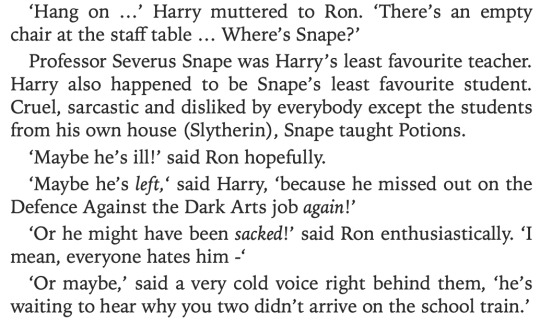
This is cut from the film, and instead it's Filch waiting at the top of the marble stairs who catches Ron and Harry being late and delivers them to Snape (I don't know why, the scene in the book is much more dynamic and would have taken up about as much time on screen). Rickman, meanwhile, is using the information he's gotten on who Snape is from the books, and imbuing some of that feral Snape energy into his portrayal of a Snape who is genuinely angry:

(Thank you for making these gifs @smilingformoney , they are truly the gift that keeps on giving.)
The thing is, no matter how much of feral Snape Rickman brought to this, no matter how menacing his performance is, this moment still lives within the dynamics of a Chris Columbus children's film. It gets cut off by Dumbledore's entrance - meant to be a comeuppance for Snape, since Dumbledore (being the voice of wisdom and fairness in this world) prevents him from punishing Harry and Ron (you know what, at least in the books they got detention, but ok). Despite Rickman's performance, Columbus as a director has framed this scene in the same context as the one Kloves cut. The tension is brief, and the focus is on Snape being foiled, because it's what children want to see - a mean adult experiencing consequences. It's down to the editing and soundtrack, choices Columbus made in the editing room. In addition, we don't know how many different ways an actor tries a scene, only what ends up in the final cut of a film. The process of the work done on a set is often much richer and more diverse than what an audience sees in the finished film.
Tbh I think this is also why Snape's feral moments were cut from PoA: it's a darker film, but had to straddle the line between being for both children and tweens and not getting too playful, nor too intense. As much as I want to see feral Snape on screen, it's extremely difficult to make work in a narrative that is about Harry and his friends. It either skews too intense, making the audience uncomfortable because seeing an adult becoming unhinged and in pain is difficult and frightening for most young people, even adults, and would therefore take away from Harry's goals and narrative as well as his changing relationship to Sirius (all of which is already barely supported by Kloves' writing). Alternately, it could also skew too comical and over the top, which takes the audience out of the tension of the film's climactic moments.
If Snape's story had gotten more focus and screen time, an unhinged moment would be better justified because the audience would have been more invested in the character and their arc. PoA sidesteps pretty much all of the most compelling parts of the book, which is the realization that Harry is not only connected to Sirius personally, but that his dad, Sirius, Lupin, and Pettigrew created the Marauders Map, that they were animagi, that Harry's patronus takes the form of his father's stag, and that Snape was initimately connected to all of them as well. For me, reading the end of PoA was what cemented Snape as someone who would be crucial to the narrative and whose role would increase as the series went on. As a result of Kloves skimming over these essential plot twists, Snape is a minor character in the film, showing up mostly as a foil who tries to expose Lupin and then catches him and Black in the Shrieking Shack (this also sets his character up to be minimized in every film down the line, which has a worsening impact as Snape becomes increasingly integral to the plot).
One thing I find interesting is that Snape's comical physicality changes over the films. In PS and CoS he's menacing, a looming, larger than life figure the children fear and easily assume to be a full-fledged villain. By GoF there's a relationship embedded in how he interacts with Harry and his friends. He's no longer terrifying, just intimidating, more of an adult Harry challenges than someone he must defeat. The comedic effect now comes from a rapport within an established dynamic between characters. By HBP, the only comical moment is at Slughorn's party, and it's no longer Rickman who uses physicality - the action happens around him, and the comedic effect is in his lack of reaction to any of it. In other words, he's no longer the comic one, he's become the straight man in a (badly written) comedy sketch (with abysmal timing, what even).
Ultimately, as with most of the characters in the HP films, Snape is undermined by the writing. Rickman was stuck working within the confines he was given. No matter how well he may have understood the character, the limited screen time and character development were always going to stifle how Snape was portrayed on screen. I'm very much pro Let Snape Be Feral but I also don't fault Rickman in how little we saw of that.
How Feral is Snape?
If I'm honest, I feel like the Snapedom has taken the Let Snape Be Feral thing and has started forgetting that he wasn't all-feral-all-the-time. The point of Feral Snape is that it's a heightened state of tension in a character whose trauma is being triggered. Apoplectic Snape wouldn't have an impact at the end of PoA if that was his usual way of being. And, as you so brilliantly showed @said-snape-softly Snape's speech patterns are primarily quiet and controlled, his speech gets softer the more dangerous his mood, and it's only after he reassumes his role as a spy that the description of his speech becomes increasingly volatile (but is still controlled). Feral Snape's definitive aspect is the lack of control shown by a character who usually is so exceptionally capable of self restraint and compartmentalization. So again, while I would have loved to see Feral Snape on screen, I think it's also important to acknowledge that this is not the defining feature of his character and is more about what those moments mean to his arc. Their absence is primarily due to poor writing that didn't create space for them (including what leads up to them), and the direction that didn't carve out any kind of niche for them, not Rickman's choices as an actor.
In fact, Snape as a character is defined by descriptors of his voice more than any other character by far. I have my own theory about why this is, and it has to do with Alan Rickman being inextricably connected with how Snape is written. Chris Columbus said that Alan Rickman was always Snape as far as he was concerned, because when JK Rowling showed him a sketch of Snape she had made, it looked exactly like Rickman. I don't think this is accidental.
Alan Rickman was always intended to be Snape
First, what's important to remember is that before Harry Potter, Alan Rickman was best known in the 90s for playing both villains and sad romantic leads. His signature defining feature was his voice. I think it was Ang Lee who described the casting choice of Greg Wise and Alan Rickman in Sense and Sensibility as wanting Willoughby (Wise) to be dashing and Brandon (Rickman) to be sexy (if this was Emma Thompson and not Ang Lee, my apologies, I can't remember where I read this and can't find the source). This is how Rickman was perceived by audiences up until Harry Potter. And I know a lot of the Snapedom considers him to be sexy as Snape too, but the general audiences of the films don't, so please don't @ me, I'm just setting up a point here.
This is relevant because, as we find out in the end of the books, Rowling wrote Snape's motivations to be rooted in romantic love (I'm very nobly putting aside, for the sake of focusing on Rowling's intentions, my personal interpretation that Snape's feelings for Lily were platonic, please acknowledge how brave I am for this). She pulls a lot from gothic tropes into how he's written, and as much as she's talked about the character having been inspired by a chemistry teacher she disliked, and as much as she's talked about Snape being both morally grey and someone she personally dislikes, she also romanticized him. Between this and what Chris Columbus said about her sketch of him, it's hard for me to ignore that this character, conceived of in the 90s, wasn't written with Alan Rickman in mind from the beginning, especially since Rowling herself has said that she envisioned him in the role. Whether or not he lived up to Rowling's imagination is, frankly, his choice and Rowling's problem.
The story of how Harry Potter was written according to JK Rowling is that it started with the idea coming to her on a train ride in 1990. She completed the PS manuscript in 1995. While everything I'm about to say is absolute conjecture, I can't help but wonder at the connection between these films and the way Snape was written (spoilers ahead, no regrets, these films have been out for over a quarter of a century - forgive my reviews, I can't help myself):
1988: Die Hard comes out. Alan Rickman plays Hans Gruber, a villain who is a genius, composed, controlled, and soft-spoken. (Great film, a classic, the only valid Christmas movie.)
1990: Truly, Madly, Deeply. Rickman plays a man whose wife can't get over his tragic death, nor can his own ghost, who comes back to spend more time with her. No one else can see him, and they can't really share a life anymore. She eventually lets him go as she realizes that his spirit doesn't belong in the mortal world and her own life can't move on as long as she clings to it. (Beautiful film, will break your heart and put it through a shredder.)
1991: Robin Hood, Prince of Thieves. Rickman is the Sheriff of Nottingham, an unhinged, feral villain who wears all black complete with billowing cape. (Terrible film, disaster of a period piece, Rickman's performance is the only redeeming thing about it. Halfway through its press tour talk shows started booking Rickman instead of the lead, Kevin Costner, because Rickman stole every scene.)
1995: An Awfully Big Adventure. Rickman is an actor who comes back to his hometown to revive his role as Captain Hook in a local theatre production of Peter Pan. In the process he has an affair with a young ginger stagehand who reminds him of his lost love, a vivacious woman named Stella with bright red hair who, as far as he knows, birthed his child - a son - before she died. It turns out the girl he has an affair with is his daughter, which he realizes when he visits her home where she lives in the care of her aunt and uncle - whose name is Vernon - and connects the dots of who this girl's mother was. (He then rides his motorcycle out to the pier, screams "Stella" at the heavens like he's in a revival production of Streetcar Named Desire, trips and hits his head on the edge of the pier and falls into the water, drowning. I can't make this up. Mike Newell directed this. The same guy who directed GoF. As if following in the vein of the 90s movie obsession with incest as the controversial-trope-du-jour wasn't enough. I don't even need to review this, just sum it up.)
1995: Sense and Sensibility. Rickman plays Colonel Brandon, a forlorn, grieving man who lost his first love at a young age and spends most of the film pining for the only other woman he's ever had a romantic interest in. Wears all black, rides a black horse.
Given what a well-known actor Rickman was in the 90s - especially in England - and how connected his characters all seem to be to various aspects of Snape, it's hard not to see a connection. The entire premise of Truly, Madly, Deeply sounds like the inspiration for the Resurrection Stone in Deathly Hallows. The redheaded lost love whose child is left in the care of an Uncle Vernon in An Awfully Big Adventure is difficult to look past. All of these characters either exude menacingly soft-spoken Snape energy, feral Snape energy, or forlorn because of his lost love Snape energy. As a result, I feel like it's almost inevitable that Rickman inspired Snape, especially when you consider how known he was for his voice and how frequently Snape's voice is used to describe him. When Rowling said that she envisioned him in the role, it makes me wonder if she meant during the casting process for the first film, or well before it. I think his previous roles were a contributing factor in how the character was written in the books. After Tim Roth - who was originally cast in the role - had to back out due to scheduling conflicts, she got her way. Authors don't often get to choose who plays their characters, but in this case it worked out as the production thought Rickman was a good fit as well.
I'm done, I promise
So where does this leave things at the end of this horrendously long post? Rickman's choices of how he physicalized Snape - comedic or not - are only part of a larger whole. He was playing a character who was written based on his other roles, and limited by the shortcomings of how Steve Kloves translated that character from Rowling's books into his own screenplays. Whatever Rickman did on set was limited by that writing, by the directors he worked with, and by the choices made in the editing room.
I'm fascinated by the idea that Rickman was playing a character written with him in mind - but not really him, the him who embodied other characters whose echoes show up in Snape. It's difficult enough to contend with an actor playing a character in a screenplay you wrote with them in mind when you're directing your own script, because they'll never be what you imagined in your head. But for that process to get filtered through several directors, a team of producers, another writer who changes your work, and an editor, let alone throughout a decade of films - that's downright wild. The original intention gets lost and reinterpreted like a game of telephone, and I think that a lot of the consistencies between Movie!Snape and Book!Snape are down to Alan Rickman's nuanced and generous nature as an actor. If I'm honest, I'm not convinced that every Snape moment that comes off comical was meant to be so by Rickman. But again, film is such a collaborative medium that his intentions aren't the only ones that matter, ultimately, at least they aren't the only thing that ends up in the final cut.
My take, personally, is that I'm more interested in critical analysis than personal criticism. I respect that everyone has their own vision of a character and fandom is absolutely here for, among other things, having a place to share those thoughts and feelings. But a character is rarely going to appear on screen the same way you see them in your head, and that's not always going to be a fault, even if it's a disappointment to you. It's interesting to hear different people's perceptions, but there isn't that much to discuss there - you can't refute how someone feels, and you can't argue that their truth is what it is, to them. Whereas with critical analysis there's a lot more to talk about and examine, so it's where my own interest is much more invested.
#asks#long post#said-snape-softly#do I have regrets about the length? not one.#is anyone still reading? not one.
51 notes
·
View notes
Text
Decided to rewatch NATLA to properly form my own takes that’s been running through my mind: (I’ll have both things that I like and dislike.) Part 1
SPOILERS!
I like it like a friend from a hundred years ago:
First and foremost, NATLA predominantly consists of Asian American Pacific Islanders. Good for them for creating a version that is more in their lens and creativity.
The Bendiiing. All of the elements, except for Earth, are 10/10. I really want it to be more solid, especially on AangvsBumi. It’s not that bad though, so much better than…well u know. I’ll give it an 8/10.
I rewatched it with a Filipino dub and it’s good, 9/10. Aang VO was convincing as a kid, so either they’re a great actor or a great kid actor. The jokes (Sokka’s sarcasm) hits better on my mother tongue
"You're my friend. You will always be my friend.”
Avatar state under the ocean
The costume. The only one that I do agree with everyone else that lacks is Zuko’s scar. They should’ve put prosthetics on the eyebrow.
Zuko’s hair? Hello? They did a great job. Even though my sister and I sing Ariana Grande song whenever we see them swaying. It’s an integral part of his story, and I loved that they keep it. There’s an East Asian culture that indicates that kind of haircut as a punishment. I remember my History teacher taught me this in eighth grade but I forgot which it was, my bad. And the actor’s such a champ for having that hair IRL.
My favorite actor performances: Gordon (Aang) superb acting. Liz (Azula). Utkarsh (Bumi). Justin Wong (Chong/SecretTunnelguy) sounds exactly like the character. Made up for my delusional expectation that Dee Bradley Baker would be in this. Ken Leung (Zhao) pisses me off so much, and that means he’s doing a great job. Dallas (Zuko) & Iroh (Paul). DDK's(Ozai) a natural idk if that's acting /j
Was it established in the OG that Katara's intro is a folklore/legend? Because yeah, I don’t mind that it is considered that way in this version.
AAAAA, the Lieutenant Jee younger casting makes so much sense now! The 41st division is chef kiss. Zuko cryiiiing when he was being banished!? Dallas Lui ate!
THE HYBRID ANIMALS LOOOK SO GOOD. The ostrich horse blended well with whoever rides them. It doesn’t look CGI to me. MOMO HIS MOMONESS, MOMO OF THE MOMO DYNASTY
Any Zuko fight choreography (MY FAVORITE CHOREO DALLAS LOOKS FIIIRE). And Aang’s too (Oh hey).
Aang the Hype Man
The fallen Fire Nation ship behind Zukka fighting. (It’s in my notes idk why but I guess background details are a win)
Aang and Iroh's interactions
NATLA Zuko (I don’t think there’s much of a difference though with the OG lol, and it’s probably because the NATLA directors/producers like Zuko)
Camera direction
The Found Family Hug™, what Netflix can do well.
End scene of Episode 1, is very cinematic. I can’t believe TV shows have come this far. I hope employees are paid well.
The End Theme remains the saaame, and is added with cinematic effects as well.
The folly/sound effect at the start of Episode 2. Why is this the only episode with that flair?
Creating a grave for Gyatso.
How Ozai’s forced unity/being totalitarian is represented. Reminds me so much of our own government, it amuses me. I know it’s not directly referencing that though. It’s good that they show it early on I guess. With the Fire Nation culty greeting as well.
On a lighter note: THE AIR SPHERE/BALL whatevah, yes! More of this goofiness. How about instead of being inspired by GOT, NATLA should be inspired by Stranger Things in terms of fantasy + childhood simplicity balanced by this trauma they're going through. (Well, ST lacks worldbuilding cause it’s just normal Earth but anyway)
Kyoshi Takeoveeer. I hope Roku gets more screen time someday though. Pls pls pls.
They incorporated the OG character theme songs! Of course! The ones I noticed right away are the FireNation Siblings’. So if you watched OG Avatar and you watched the scene where a mysterious girl joins the infiltration of the FN Royal Palace, you’ll know who she is.
Sorry not sorry, Daddy Dae Kim is daddying. (Although he did catch me off guard in Zuko’s Agni Kai lmao.) The plot.
The Aang VS Zuko fight! A reference to the Fortune Teller fight. The team did so well.
Zuko The Master of Disguise Major In Stealing Clothes. Full-time Avatar researcher.
A fourth wall foreshadows Bumi’s OOC for this version. Jet’s "he’s not like he used to be" in line. I mean they did warn us.
Another 4th wall is the line “Things shouldn’t be here” referring to the prototype Fire Nation balloon.
Nice animation with the retelling of Two Lovers legend.
Lu Ten Funeral scene ate. That single teaaaar. I recommend everyone who loves the animation to watch this scene. To feel something idk AHAHAHAH.
The actors were convincing when interacting with CGI animals. Specifically the badger moles.
ZUKO AND IROH SCENES!
CGI’s great did not waste any money
In Katara’s flashback. She experienced this in her present form. And when she was so scared to go to the place where her mom was killed, she immediately changed back to her young self. Like, I wanted that so bad when I was watching the flashback. I thought, this shouldn’t be the present-day Katara. There should be a moment when she switches back to young again. And they did.
Big Iroh moment that makes you cry as an adult when Gyatso was reassuring Aang that the genoc*de wasn’t his fault, and shouldn’t blame himself. Ahh, and the subtle sadness as they say goodbye.
Random eye drawing from Zuko. He’s an artist AHAHAHAH. Okay, I forgot which episode. Sincerely, unreliable narrator.
Showing Zuko's scar when Aang says "Do you even know that lives are at stake".
Basically every scene/plot they 1 by 1 copy from the show. Did not disappoint (well, maybe because OG showrunners were there). Blue Spirit, Siege of the North.
Zuko’s room. I love me some character bedrooms. He’s like a TV Sitcom character for that.
Gaang teamwork scenes! It works and it's dynamic.
Hahn as an honorable man? Yes. I don’t like love triangles so much. I like me some camaraderie. And Ian (Sokka) acted well for feeling included and seen as Hahn recognized his value as warrior/intel.
Zutara fight scene.
Two points that I don’t know if I like but it makes me realize some stuff:
Meek Katara. I know there are specific plot points that Feisty Katara is needed. But she was always nurturing, so I think it makes sense she’s…meek? That Jet scene explains it. Maybe because I relate to her being a log AHAHAHAH. But yeah, uh, I do not, ironically, have strong feelings against that water down.
Angry Bumi. IDK how to feel about him tbh. I always think Bumi is…harsh like that. Almost scary. But yeah, he never blames Aang. Still, it doesn’t feel out of place here. He will return anyway so he’s not this one-dimensional character that is only angry at his friend (hopefully). I never thought of how Bumi would actually feel. And that he will be upset, and now it’s sad because that’s like your friend when you were twelve years old and you wonder where he’s been all this time, and if he’s alive. And..war..never made it any better to process that emotion. So, we got two versions, one that is cautious and then eventually welcomes him, and another who's completely angry and blames a literal kid that he does not know the pain (from the war). Too real, and I personally don’t mind.
#natla#natla spoilers#natla review#atla live action#gordon cormier#dallas liu#ken leung#elizabeth yu#natla zuko#natla positivity
11 notes
·
View notes
Text
Get a Load of Traits - PART 2: Dr. Eggman
It's that time again, folks. Time for another analysis you didn't ask for.
I explained how the setup goes with my previous installment revolving around Sonic, but to recap: for the sake of not dragging things out too much, I’ve decided to keep it all thematically consistent by sticking with 9 main points per character, in terms of what I personally consider the highest priorities for each of them. These will usually not be listed in any particular order of importance or relevance unless stated otherwise, and while there may be other major traits that might not get mentioned (in which case, feel free to bring them up yourself if you see fit), this keeps things simple and focuses on the points that have the most flexibility with how much of the character they encapsulate.
It should also be noted that these posts are made with the game portrayals in mind, because the games mark the core of the franchise, and as such, they objectively contain the purest essence of the cast. Adaptations generally like to play by their own rules, some more gratuitously and inexcusably than others, and this will inevitably crop up with certain entries. All that being said however, I’ll attempt to stay focused rather than devolve into another rant about this adaptation or that adaptation, only directly referring to them if I feel it’s necessary for the point being made.
Anyhow, for today’s installment, the spotlight shines on everyone's favourite villain that they pretend isn't a villain: Dr. Eggman.
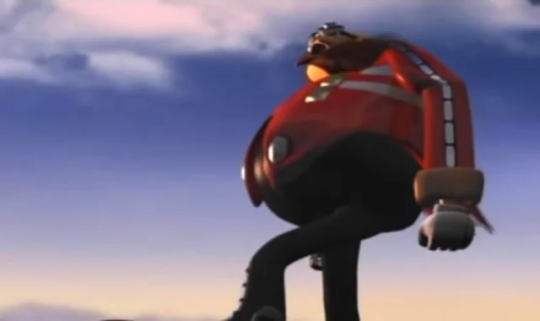
He's larger than life.
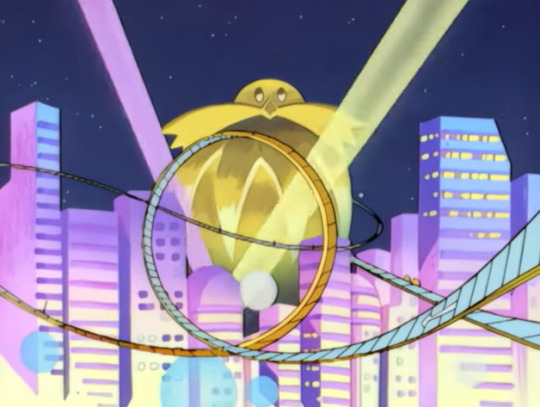
Where could he be???
He's shaped like an egg. He laughs and bellows like it's going out of fashion. He proudly announces when he's in the room for no other reason than to inform everyone that he's in the room. He takes sadistic glee when you don't have enough memory in the memory card. Why would you want to sawdust away this side of him? What are you, a Hollywood writer?
Just as Sonic is a fun hero, it's integral that Eggman is a fun villain. He's all about the colour, the spectacle, the raw energy. This is non-negotiable. If you approach this character and think he needs to be made grounded because he has a silly name or something, then you are going about this the completely wrong way. Villains like Eggman get praised all the time for being vibrant and wacky, so frankly, there is no excuse to write him off for it.
He is genuinely smart.

"Oh yeah? Well if you played nice, I wouldn't need to transform you into a tedious gameplay mechanic that appeals to furries and is guaranteed to give this game negative reviews from IGN. Haha, gottem."
Look at the screencap above. He was able to turn the tables against Super Sonic right when it looked as though he was thoroughly cornered. How was he able to achieve this? By planning.
*leans closer to the mic*
P L A N N I N G.
Yes, he is not literally omniscient. Yes, he can be prone to the occasional oversight. Yes, unexpected events can transpire that would be difficult if not impossible for him to account for. But all that aside, Eggman is a genius. He does have an IQ of 300. He talks a big game, but with all the amazing tech he's created over the years, and with all the ways he's pulled a fast one over the heroes, he has proven that he can play the big game. Need I remind you that this is a human, and his arch-nemesis is the fastest thing alive, not some dude on the street. He would need to be on his A-game in order to last.
And yes, it is indeed him who does all that brainstorming. Ever since day 1, he's always been very hands-on with his operations, not needing to steal the credit from another scientist or force a hostage to do it all for him. His plans? His weapons? They're all him. Would a mere bumbler be able to subdue the Time Eater?
He is genuinely evil.
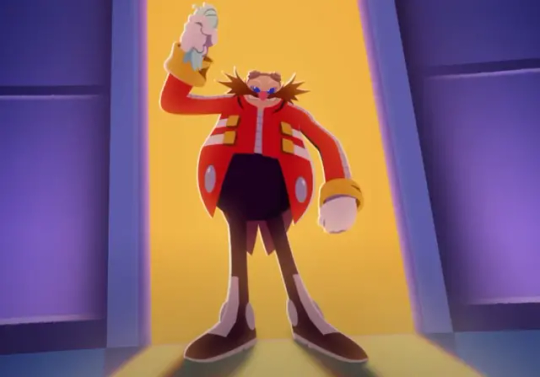
"What's this shite I'm hearing about a Mr. Tinker...?"
We've got the Triforce of Funny Man. We've got the Triforce of Real Intelligence. Now here comes the hardest pill to swallow: the Triforce of Actually Malevolent.
For reasons that can be pinned on certain portrayals that are coincidentally more commonly found in adaptations, fans are all too willing to remove agency from Eggman's villainy. When they're not claiming an amnesiac personality that peaced out as quickly as it arrived is his true self, they're claiming he has all these heated gamer moments for the purpose of avenging his Wasted™ grandfather, Professor Gerald Robotnik. Or they claim he's not as bad as other villains in the franchise because he "only" wants to conquer the world, rather than destroy it.
Now how can I put this gently...
youtube
No, I am not just saying this because I personally happen to favor Eggmen with proper villainous balls to their name rather than glorified frenemies with Sonic at best. Even when exorcising myself of all potential bias, the Eggman we see in the games is still a very different fellow from what a concerning number of fans say with a straight face he is.
He stuffs animals inside robots on a regular basis. He lies, cheats, and backstabs on a regular basis. He fired a laser at the planet with the intent to fracture it, with no consideration for destruction or fatalities. He conquered other planets just to reduce them to self-indulgent attractions for his theme park. He drove a friendly robot to insanity after they were willing to give him the benefit of the doubt. He wanted to destroy Station Square right out the gate, with the only difference come the end of his rope being that he changed tactics to more suicidal means out of desperation. When the Deadly Six were defeated, and the world remained in a dire state, his only reaction was to express relief that there was still something for him to lord over. And although Forces may have glossed over much of his rule, it's clear that it wasn't pleasant for anyone other than himself. Throughout all of this, he rarely brings up Gerald in a consistent manner outside of SA2 and ShtH, and in fact, even in those games, it's pretty clear that he only cares about Gerald's scientific legacy and how that makes him special in the process due to being his grandson. He's never been shown to give a damn about the rest of Gerald as a person, including the philanthropist he was at heart prior to his last days.
Not wanting to destroy the world is not an act of kindness. It's simple logic: he can't conquer something that's not there. And is treating the population to a lifetime of slavery really that softer than a quick and (relatively) painless death? I'm sure TV Tropes would say yes, but what do you think?
He's a self-made man.
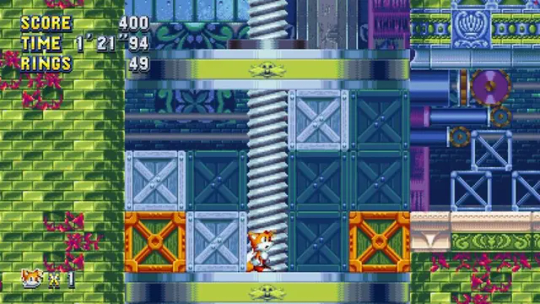
Egg Jameson confirmed.
Our horizontally enlightened fiend did not start with a kingdom of his own. He was not a test tube baby who could shoot lasers out of his hands from day one. He was not born a demon, nor did he hail from a bloodline of gods. When he began his path in life of being a furry shamer, he had only his gadgets and tools to work with. Yet, he has managed to carve himself a bountiful list of pro gamer moves over the years despite his mortal human status, including harnessing the Time Eater as mentioned, bringing his dream Eggmanland to life in all its glory, and the engineering marvel that is Metal Sonic... and almost never suffering from financial troubles despite the frequent destruction of his machines at Sonic's hands. (Keep Sonic 4's name out your fuckin' mouth.)
And speaking of that last part, there has been evidence across the series that he has more than one way of ensuring the moolah keeps rolling in. We've seen him set up casinos, carnivals, Extreme Gear companies, newspaper factories, and other facilities to extend his reach. We've seen his robots mine for resources all over the world, and occasionally other worlds. We've seen him own a literal ocean of oil. We've even seen him sell his stripped down robots to chumps who don't know any better. For all his childish ways and penchant for plagiarizing the Death Star, he's surprisingly good at money management.
Then there's his specific approach to scheming and beating Sonic. Winning on its own is never enough for him: he wants to win on his terms, by doing things his way. So he might steal a shiny gem, but he'll use it to power the tech that he made. He might wake up a sleeping beast, but he'll have an Egg Carrier operating alongside it. The doc is always pulling his weight no matter the game, because if he didn't, how could he back up his self-admired intellect without it ringing hollow? You know he wouldn't be having that.
All of this goes a long way to explaining how he grew a knack for being so pro-active as a villain in the present day of the games proper. Instead of having it easy by being born an almighty superbeing, he had to work his way up using nothing but his brain. Because Dr. Eggman is a man with quite a few admirable qualities. Just a shame that morality is not one of them, no matter how much I've been gaslit by fans into believing otherwise.
His ego is his motive.
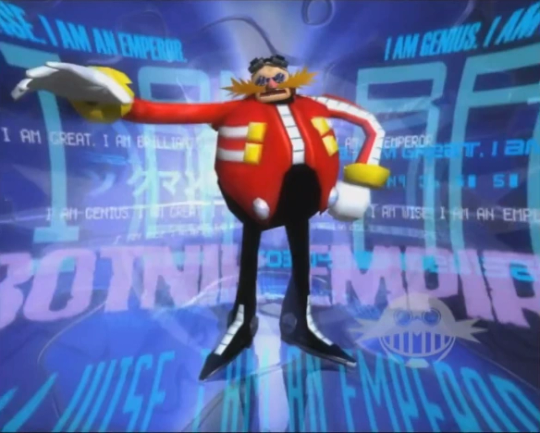
Don't say it.
As we discussed, for all his manufactured admiration of his late grandad's genius, he doesn't mention him as often across the franchise as fans would lead you to believe. But you know which moustached gentleman he does mention a lot throughout the franchise...?
An overfilled sense of pride is to be expected for a pure villain. Regardless of their motive and their means to fulfill said motives, they're expected to think highly of themselves to some degree. But Eggman is not your everyday egotist: he IS the ego. Many villains have made statues of themselves, but how many do you know who have defaced historical monuments and plastered their visage on them? How many villains do you know who call half of their machines Egg Something? How many villains do you know who make up every single boss in more than one installment?
That's because Eggman's ego isn't just part of his character: it's the source of his drive. Everything he does, everything he wants to do, is fueled by how much he loves himself, and how displeased he is that the rest of the world does not feel the same way. He wants everyone to bow down to his excellence, he wants to conquer the world to satisfy his lust, and even that wouldn't keep him satiated forever, since evidence has shown that he would just make a grab for the whole universe if he got bored. He cannot picture a world where anyone else matters, because they're not him. Over the span of three decades, his inflated self-worth at the cost of everyone else's agency and wellbeing has not diminished one iota, and unless SEGA decides to pander hard to the Eggdad standom, this is not likely to change anytime soon.
Which leads me to my next point...
The consequences are irrelevant to him.
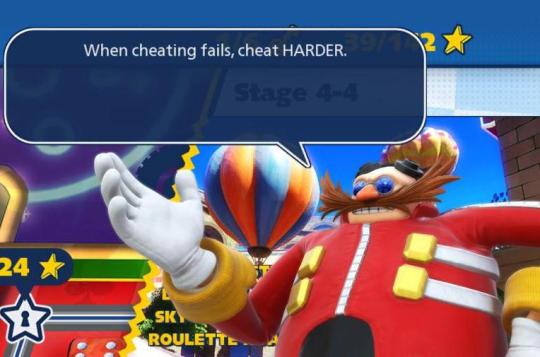
Quote by Billy Mitchell.
Part of the recurring problem with Eggman being woefully mischaracterized as not such a bad guy when you get to know him is because people like to suggest that since he rarely shows outright sadism while committing his evil deeds (except this is also not true; see Tails' story in SA1, or the sheer ecstasy in his tone when he betrayed Emerl's trust in Battle), that means the results that spring from them are more excusable than the likes of Mephiles, Starline, Disney, etc.
Putting aside the fact that he's still willingly committing these deeds to begin with - with no regret at that - let's assume they mean in reference to ordinary citizens and the like. Now maybe it's true that he's not known to dedicate much of his career to making things personal with random nobodies. But let me ask you something: when he declared his intent to destroy Station Square with Chaos so he could build ROBOTNIKLAND THE ULTIMATE CITY WHERE I WILL RULE IT AAAALLLL COME ON CHAOS LET'S FIND ANOTHER EMERALD SHALL WE Eggmanland over its remains... did he say anything about letting the residents evacuate? Did he provide a means to help them evacuate?
What you need to keep in mind is that Eggman showing little interest goes both ways. He doesn't give any thought to these folk period. If his giant mech killed people who were in his way, or he fired a cannon at Whocaresville and the people living there didn't have time to get out of dodge, he's not going to shed a tear and call for a moment of silence. Because, as we've already established, the only person that matters is him. So long as he gets what he wants, and so long as there are still other people out there to worship him, what's the big deal if some kid is now without a parent or a home?
He is not a good master.

"Also, I did create a vaccine. That's what you get for listening to our loving fans who hate us."
Well, at least he shows a more caring side to his creations, right? Sure... if you don't pay any attention to how it plays out onscreen.
My dude is certainly willing to shower his creations with high praise, but what advocates of Good Guy Eggman fail to note is that he praises them because he made them. An achievement for them is an achievement for him, because how would they be so brilliant and competent if it weren't for who built them that way? And you know what else? That praise conveniently only manifests when the creation is doing their job: the moment they fall short of his lofty standards, he flips like a switch. Can it truly be considered sincere and from the heart if he's that willing to turn on them that easily?
Of his many robotic stooges over the years, two that he held in high esteem were the E-Series and Metal Sonic. He made a show of tasking the former with an important mission, and the latter has been recognized repeatedly as one of his crowning masterpieces. And yet, all of the E-Series bar Gamma were discarded and essentially left to fend for themself in an unfamiliar world, with Beta being forcibly modified without a second thought. Gamma was only spared because, you guessed it, he was the one with a victory to his name. As for Metal Sonic, for all his longevity and special treatment, he too is not immune to punishment in the event of failure or disobedience.
And Infinite? His prized right-hand man during his six month conquest? Whisked away without a word after one bruh moment too many, followed by making a point to show off his own mastery over the (real) Phantom Ruby.
Needless to say, this is a stark contrast from the goofy dad you often see in fanart.
His will is equal to Sonic's.

"I'm gonna have to reset, that was a practice run."
Being a regular human does not serve as a limitation for Eggman's status and capabilities, unless you're a hack writer who believes superficial power levels are the instant-win key to a good antagonist, or a well-crafted story in general. On paper, a hedgehog with Sonic's level of power should have dealt with this silly old man once and then never again. That happened with aliens. It happened with gods. It happened with talking ballsacks. Yet Eggman is still around. Despite being subjected to a wide selection of situations that should have Big Oof'd him, with Sonic normally not considering saving him from said perils a high priority, Eggman keeps surviving, and he keeps trucking on.
Why? Because main villain immunity, yes, but compared to Bowser the fire-breathing turtle, and Ganon the occasional boar-shaped demigod, a human scientist managing to persist for as long as he has is still impressive even without the out-of-universe justification. This detail of his character is even incorporated into his boss fights: the Egg Viper battle ends with a kamikaze attack. The Mega Death Egg Robot had a second machine stored inside it, keeping up where the fight left off as the first one conks out. S3&K in its entirety was practically dedicated to his absolute refusal to call it quits.
He doesn't give up. He never gives up. And he's not the type to piss his pants either. When the odds are stacked against him, he will either give it his all with much gnashing of teeth, or he'll retreat because it's the tactically sound thing to do. What he doesn't do is show fear and plead for his life. (Unleashed doesn't count, that was a Wily ploy.)
He hates Sonic.
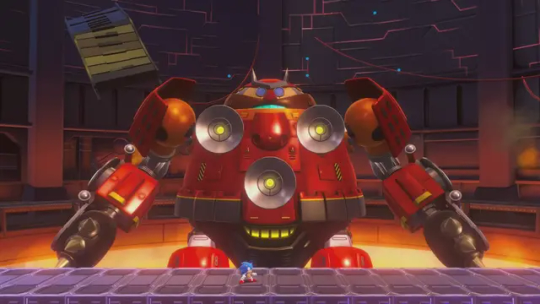
Or else he wouldn't have made this.
You would think this would go without saying. You have not spent enough time in the Sonic community. I wish I was you. (Then again, I met my friends through it...)
There are many people - many, many, many people - who will vehemently drill into your head with the trustworthy assurance of a SonicTuber that Dr. Eggman, arch-nemesis of Sonic the Hedgehog, world's longest Attempted Sonic Murderer champion, secretly likes the guy deep down, and would never wish for the Blue Blur to actually kick the bucket for good. They claim that when push comes to shove, the old doctor would never fully commit to world domination, because he simply enjoys his bouts with Sonic too much.
For X!Eggman? Probably.
Boom Eggman? Definitely.
Game Eggman? The Eggman? No.
Eggman hates Sonic. Eggman loathes Sonic, and he loathes the rest of his multicolored accomplices just as fiercely. The amount of times he has tried to bust a cap in Sonic's ass is plausibly in the triple digits. He has subjected Sonic to all kinds of threatening, terrifying situations with the explicit purpose of either killing him or hitting him where it hurts. He shows happiness when Sonic is in pain, or has appeared to have been vanquished by his efforts. What about any of this suggests that he likes him? Because of respect?
Now yes, that much is true. It's evident that Eggman respects Sonic as an opponent who can keep up with him, and it's true that he enjoys their battles to an extent. That's not the same thing as actually liking the guy on a personal level. For all the respect he may wield, he would still gladly rid himself of the hedgehog the first chance he gets. Remember the big moment in SA2 in which he launched Sonic into space? He bid his farewell, in a semi-mocking tone, then went right back to business like it was nothing. And what about Forces? What did he plan on doing with Sonic once he got bored of waving his victory in his enemy's face? That's right, he planned on slamming the red button on him. Sorry you had to find out this way, that's what happens when you don't Play The Game.
Ivo Robotnik is a jovial man, but his goals are dead serious. He wants his empire more than anything else in the world, and he will get it. For whatever thrills their encounters may provide, he would piss on Sonic's grave without a moment's hesitation in order to make progress with his ambitions. If he wasn't serious about taking over the world... why the fuck would he do all that he does? Do you really think he spends all that time researching ancient tablets because he wants to be Sonic's friend? Do you think he enslaves alien races because it's not like he likes Sonic or anything baka kawaii desu (please don't unfollow me, I won't do it again)? I don't think so, chum. There'd be no game, and no franchise, if Eggman wasn't coming up with ways to put him in an early grave. And then probably vandalize the grave after.
---
If you understand all of these points, and if you can take to them, then I believe you should have what it takes to write a good, or even great, portrayal of Dr. Ivo "EDP445" Robotnik. No portrayal is going to be one-and-one with that of another, there'll always be subtle distinctions depending on the writer, but you'll be fine as long as he's not a softie or a fool who only exists to be replaced with a gay platypus.
Oh and, one last thing...

Heroes manual lied to you. Sorry, English fandom.
23 notes
·
View notes
Text
I need help crafting head canons and backstories for a BSD au I'm creating
I'm working on making head canons for a normal world no mafia no Ada or whatever au. For the most part I'm trying to take canon events and adapt them in a way where they could realistically happen, but for characters with more unknown or vague pasts I'm great for any HCs
Starting with Dazai, Dazai is not an orphan he was removed from his home by CPS when he was about 2. He was in the foster care system for a while, tossed around until he ended up in a home with Mori from ages 9-16. Mori was abusive, so Dazai ran away and lived in a shipping crate for a bit. Eventually he was taken in by Oda, who was a foster parent to mostly younger kids. He was there for 6 months but when he was out with Oda, Oda was killed in a mass shooting.
I know Dazai "improved" in canon after Oda died but I didn't give him a chance for this big long speech and there wasn't any reason for Oda to anyways, so Dazai completely spiraled after that. I have like a whole story written about that. But short things is his alcohol addiction got worse, he often spent days just not moving from Oda's grave and since you see him inject himself in season 5 and pop a pill in season 2, I have him experiment with drugs like fenty, shrooms, and heroin. Not addicted, just trying them out. Dazai is my most fleshed out in the au I'm creating, idk why.
Dazai bullies Akutagawa in school because of course he does.
Now for Chuuya I haven't finished stormbringer so my HCs for him might change. But.
He was also in foster care. I haven't fully fleshed out his life yet and I want some ways to integrate the sheep some how? But he entered the system when he was 8, I don't know why because I haven't finished storrmbringer. It varies from Verlaine killing his parents to them dying in a car crash so. Working on that. Verlaine went to a different home from Chuuya, he doesn't know him well he just hates him. I've been debating between having Kouyou be his sister or foster mother, but since I put Dazai with Mori I figured Chuuya could go with Kouyou and she'd just be a younger foster mom. I was also thinking I could find a way to make them in the same house? I really want the whole betrayal thing where Dazai leaves Chuuya and I thought it could be cool where Dazai left Chuuya in an abusive home to deal with it himself but I'm not sure, would it even make sense for him to have been with Mori?
Chuuya is in college, Dazai is struggling to get by. They still have their personalities obv so Dazai isn't like this sad mopey mess he's just a sad mess who mopes when he's alone and everyone doesn't really realize where he's at mentally
Mori has also fostered Yosano and Q, while having Elise as his bio daughter.
Atsushi and Lucy's backstories are basically the exact same as they are in canon
Akutagawa is homeless ofc, he just moves from place to place with his sister. His clothes are shit and he smells because he never showers so he isn't treated well at school. I'm tryna think if he'd go to college, also he's still got his terminal illness. I'm not sure how his need for Dazai's validation would come out in this au
Ranpo was adopted by Fukuzawa. His life was also basically the same. Yosano was also adopted by him.
I'm thinking Kunikida has a normal ass life with normal ass parents, just too much of an overachiever and on the verge of burnout but not allowing himself to burn out
Poe is rich. He was born rich, he's got money, that's all. I've got for him lol.
I'm trying to find ways to add the rest of the cast, I want to get all the characters in and get them lives and stuff made up.
If you have any suggestions to how I can expand this world I want to write fan fiction on it once I've fleshed it out a bit. Feel free to be like "actually no I dont like your idea, I think this would be better" because I'm open to any criticism on this, I just want it to be good and I'm not stuck on my ideas
12 notes
·
View notes